4 Volumes
Constitutional Era
American history between the Revolution and the approach of the Civil War, was dominated by the Constitutional Convention in Philadelphia in 1787. Background rumbling was from the French Revolution. The War of 1812 was merely an embarrassment.
Philadephia: America's Capital, 1774-1800
The Continental Congress met in Philadelphia from 1774 to 1788. Next, the new republic had its capital here from 1790 to 1800. Thoroughly Quaker Philadelphia was in the center of the founding twenty-five years when, and where, the enduring political institutions of America emerged.
Robert Morris' United States
Robert Morris of Philadelphia created many of the best features of the United States. His face might be carved on Mount Rushmore if he hadn't created one really bad feature, as well.
Worldwide Common Currency and Corporate Headquarters
The Death of Money
Robert Morris: Think Big
Robert Morris wasn't born rich, or especially poor, but he was probably illegitimate. He had no recollection of his mother; his father, a tobacco trader in England, emigrated to Maryland and died rather young. It didn't take long for young Robert to become one of the richest men in America.
Robert Morris was born in England, probably illegitimately, to a mother of whom he had no recollection, and a father engaged in tobacco trading. The father emigrated to the Eastern shore of Maryland, traded tobacco furiously, and soon sent for his 10-year old son to join him. Later dying at age 39 in a waterfront accident, the father left orphan Robert to be sent from Maryland to Philadelphia for apprenticeship and tutoring. Trading tobacco produces a particular personality in the trader, since a distinctive feature of tobacco is that it does not spoil if stored. This characteristic then allows it to be held off the market until prices improve, an extension of which is the ability to dump it on the market unexpectedly. This makes tobacco trading a contact sport, where winning regularly involves jostling your competitor friends by driving their prices down. Thus, tobacco traders are distinctive, neither complaining when they are hurt, nor tolerating competitors who complain when the game goes against them. The nature of things makes the personalities of tobacco traders different from traders of commodities which must be sold as soon as possible, regardless of price.
Judging from the concise prose of Robert Morris' later correspondence, and the complicated transactions of the large merchant firm he soon managed, his haphazard education must have been more effective than it sounds. An orphan on the waterfront might easily be expected to develop his sort of aggressive toughness. And his conviviality bordering on excess drinking behavior might be anticipated from his waterfront adolescence, or even the fact that he sired an illegitimate daughter.
On the other hand, this particular waterfront orphan quickly picked up the manners of gentility from employment by Josiah and his son Thomas Willing, the most prominent merchants of Philadelphia. After his own father died, Thomas Willing soon welcomed Robert Morris into partnership in the firm renamed Willing & Morris, boasting nine ships operating from its own wharf and counting house, and sharing ownership in a number of other ships. Morris then married Mary White, according him assured standing within the highest society of the largest city in America, renting his own family pew in Christ Church and all the rest. He was talented, a quick learner with prodigious energy. And one who was unashamedly on the make.
Background: Low-Hanging Fruit Starts Running Low

|
| Peaceable Kingdom |
The Royal Proclamation of 1763 terminated the French and Indian War with a clause prohibiting westward settlements past what is now the Appalachian trail. The resulting peacefulness with the Indians encouraged new waves of immigration, but to different degrees among the colonies. Pennsylvania had been settled rather late, so it still had ample room for expansion within its borders. The consequence was prosperity, followed only later by growing land shortage. Since the Proclamation declared that only the British Government might authorize land purchases from the Indians, a suspicious reaction among some speculative minded colonial settlers was that it was intended to create an unfair monopoly for the British Ministry to use as a patronage pool. While the colonials clearly had ulterior incentives, there is no doubting the sincerity of their uneasiness whenever King George appeared to be seeking to co-opt the Parliament, which they viewed as protecting the interest of the citizens against those of the Crown. Other signs of land hunger were beginning to surface as well. Virginia topsoil was wearing out from tobacco farming, while New England never did have more than a thin rocky soil. New England and Virginia were therefore particularly pinched by the Proclamation. Pennsylvania settled nearly a century later was less bothered. George Washington himself was a good example of Virginia Cavaliers turning uneasily toward the vast Ohio Territory for future expansion. Mt. Vernon was already costing him money instead of providing him income. While New Englanders had similar aspirations for the Western Reserve (of Ohio), they also had options of turning to manufacture and maritime trade for revenue.
Meanwhile, the parent nation of Great Britain was itself starting to look for new revenue sources to finance its growing overseas empire and European wars. With a change in the dynasty of Kings of England to the Germanic William and Mary, there appeared to be less sensitivity to the traditions of liberty among English settlers in North America, less awareness of the emotional depth of colonial insistence on individual rights and property. These were not recent 1763 issues; they were connected to English quarrels with King Charles I and other matters dating back to the Magna Carta. But after several decades of outright neglect of America, the British Ministry nevertheless turned to the North American colonies as a cash cow. And just like businesses treated as cash cows within a modern corporate conglomerate, the cows demanded more control over the milking.
To this, add the effect on Puritan minds of licentious behavior reported about the rulers of Restoration England, an impression constantly reinforced by flamboyant costumes and hair-do on display in aristocratic portraits. As viewed by earnest religious settlers in frontier America, this country might be getting to be an empire exploited by unfit rulers, quite unlike the austere religious utopia which had tempted them to settle here. Since the earlier English Civil War had taken the form of empowering members of Parliament to be citizen defenders, ultimately even leading to the execution of Charles I, it was troubling to imagine rentier aristocracy log-rolling with Parliament, even wearing the same sort of garments. These descendants of refugees could even imagine English aristocrats might be reaching across the ocean, and into their pockets.
Foreground: Parliament Irks the Colonial Merchants
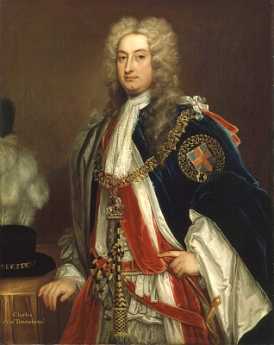
|
| Charles Townshend |
Charles Townshend, Chancellor of the Exchequer under King George III in 1766-67, had a reputation for abrasively witty behavior, in addition to which he did carry a grudge against American colonial legislatures for circumventing his directives when earlier he had been in charge of Colonial Affairs. His most despised action against the Colonies, the Stamp Act, seems to have been only a small part of a political maneuver to frustrate an opposition vote of no confidence. The vote had taken the form of lowering the homeland land tax from four to three shillings (an action understood to be a vote of no confidence because it unbalanced the budget, which he then re-balanced by raising the money in the colonies.) The novelist Tobias Smollett subsequently produced a scathing depiction of Townshend's heedless arrogance in Humphry Clinker, but at least in the case of the Stamp Act, its sting was more in its heedlessness of the colonies than vengeance against them. One can easily imagine the loathing this rich dandy would inspire in sobersides like George Washington and John Adams. After Townshend was elevated in the British cabinet, almost anything became a possibility, but it was a fair guess he might continue to satisfy old scores with the colonies. When King George's mother began urging the young monarch to act like a real king, Townshend was available to help. On the other hand, the Whig party in Parliament had significant sympathy with the colonial position, as a spill-over from their main uproar about John Wilkes which need not concern us here. Vengefulness against the colonies was not widespread in the British government at the time, but colonists could easily believe any Ministry which appointed the likes of Townshend might well abuse power in other ways before such time as the King or a more civilized Ministry could arrive on the scene to set things right. It was vexing that a man so heedless as Townshend could also carry so many grudges. Things did ease when Townshend suddenly died of an "untended fever", in 1767.
Whatever the intent of those Townshend Acts, one clear message did stand out: paper money was forbidden in the colonies. Virginia Cavaliers might be more upset by the 1763 restraints on moving into the Ohio territories, and New England shippers might be most irritated by limits on manufactures in the colonies. But prohibiting paper money seriously damaged all colonial trade. Some merchants protested vigorously, some resorted to smuggling, and others, chiefly Robert Morris, devised clever workarounds for the problems which had been created. Paper currency might be vexingly easy to counterfeit, but it was safer to ship than gold coins. In dangerous ocean voyages, the underlying gold (which the paper money represents) remains in the vaults of the issuer even if the paper representing it is lost at sea. Theft becomes more complicated when money is transported by remittances or promissory notes, so a merchant like Morris would quickly recognize debt paper (essentially, remittance contracts acknowledging the existence of debt) as a way to circumvent such inconveniences. In a few months, we would be at war with England, where adversaries blocking each other's currency would be routine. By that time, Morris had perfected other systems of coping with the money problem. In simplified form, a shipload of flour would be sent abroad and sold, the proceeds of which were then used to buy gunpowder for a return voyage; as long as the two transactions were combined, actual paper money was not needed. Another feature is more sophisticated; by keeping this trade going, short-term loans for one leg of the trip could be transformed into long-term loans for many voyages. Long-term loans pay higher rates of interest than short-term loans; it would nowadays be referred to as "riding the yield curve." This system is currently in wide use for globalized trade, and Lehman Brothers were the main banker for it in 2008. And as a final strategy, having half the round-trip voyage transport innocent cargoes, the merchant could increase personal profits legitimately, while cloaking the existence of the underlying gun running on the opposite leg of the voyage. If the ship is sunk, it can then be difficult to say whether the loss of such a ship was military or commercial, insurable or uninsurable. In the case of a tobacco cargo, the value at the time of departure might well be different from the value later. Robert Morris became known as a genius in this sort of trade manipulation, and later his enemies were never able to prove it was illegal. Ultimately, a ship captain always has the option of moving his cargo to a different port.
Other colonists surely responded to a shortage of currency in similar resourceful ways, including barter and the Quaker system of maintaining individual account books on both sides of the transaction, and "squaring up" the balances later but eliminating many transaction steps. Wooden chairs were also a common substitute as a medium of exchange. But "Old Square-toes," Thomas Willing, experienced in currency difficulties, and his bold, reckless younger partner Morris displayed the greatest readiness to respond to opportunity. Credit and short-term paper were fundamental promises to repay at a certain time, commonly with a front-end discount taking the place of interest payment. The amount of discount varied with the risk, both of disruption by the authorities, and the risk of default by the debtor. This discount system was rough and approximate, but it served. Quite accustomed to borrowing through an intermediary, who would then be directed to repay some foreign creditor, Morris, and Willing added the innovation of issuing promissory notes and selling the contract itself to the public at a profit. Thus, written contracts would effectively serve as money. A cargo of flour or tobacco represented value, but that value need only be transformed into cash when it was safe and convenient to do so.
The Morris-Willing team had already displayed its inventiveness by starting a maritime insurance company, thereby adding to their reputation for meeting extensive obligations; they established an outstanding credit rating. Although primarily in the shipping trade, the firm was also involved in trade with the Indians. There, they invented the entirely novel idea of selling their notes to the public, essentially becoming underwriters for the risk of the notes, quite like the way insurance underwriters assumed the risk of a ship sinking. Their reputation for ingenuity in working around obstacles was growing, as well as their credibility for prompt and reliable repayment. In modern parlance, they established an enviable "track record." A creditor is only interested in whether he will be repaid; satisfied with that, he doesn't care how rich or how poor you are. The profits from complex trading were regularly plowed back into the business; one observer estimated Robert Morris's cash assets at the start of the Revolution were no greater than those of a prosperous blacksmith. It didn't matter; he had credit.
In the event, this prohibition of colonial paper money did not last very long, so profits from it were not immense. But ideas had been tested which seemed to work. Today, transactions devised at Willing and Morris are variously known as commercial credit, financial underwriting, and casualty insurance. In 1776, Robert Morris would be 42 years old.
Pennsylvania: Browbeaten Into Joining a War
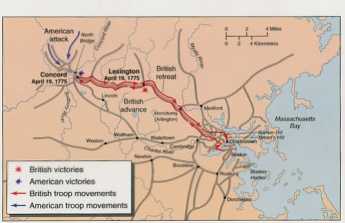
|
| Battle of Lexington |
In April 1775, the colonial militia were shooting it out with British soldiers at Bunker Hill and Lexington/Concord. If you include December 16, 1773, Boston Tea Party, Massachusetts had been fighting the British for almost three years before July 4, 1776. It had never been absolutely clear to Pennsylvanians just what they were fighting about in New England, beyond the fact that a considerable store of gunpowder was hidden in Lexington and Concord and British soldiers had been sent to confiscate it, along with those two trouble-makers, Samuel Adams and John Hancock. The militiamen behind the trees were just as British as the soldiers were, and their short slogan of fair treatment was to elect representatives to any Parliament which claimed a right to tax them. Snubbed by a high-handed King, they got his attention by shooting back when the King tried to enforce laws they had not had a chance to vote on. Seeing your neighbors shot soon clarifies your options. Other colonies, especially Pennsylvania, Delaware and South Carolina, were slower to anger about either taxation or representation, worrying more about the motives of unstable leaders in Massachusetts like Samuel Adams, and content to stall while British Whigs led by Edmund Burke and the Marquess of Rockingham tried to civilize the king's ministry. Besides, the British were not attacking Pennsylvania.
To be fair to the hot-headed New Englanders who were apparently stirring up so much unprovoked trouble, a better case could have been made against the heedless British ministry, and New England lawyers should have made it. Following the Boston Massacre, there was genuine alarm among lawyers like John Adams that King George was eroding historic legal rights achieved over several centuries, indeed, preferentially undermining them more for mere colonists than for U.K. citizens with a vote. The Navigation Acts of the British government, in particular, were offensive to American colonists; randomly chosen representatives on juries proceded to render them unenforceable with a wide-spread refusal to convict. They were employing William Penn's strategy of "Jury Nullification", and better acknowledgment of its legal history was sure to make a favorable impact on Philadelphia minds. Somehow, the Boston legal community felt this line of argument was too specialized to be effective, or else shared the alarm of their enemy the British Ministry that Jury Nullification in the hands of the public could be too hard to control. John Adams had made a particularly famous defense of John Hancock who was being punished with confiscation of his ship and a fine of triple the cargo's value. Adams was later singled out as the only named American rebel the British refused to exempt from hanging if they caught him. As everyone knows, Hancock was the first to step up and sign the Declaration of Independence, because by 1776 there was also widespread colonial outrage over the British strategy of transferring cases to the (non-jury) Admiralty Court. Many colonists who privately regarded Hancock as a smuggler were roused to rebellion by the British government thus denying a defendant his right to a jury trial, especially by a jury almost certain not to convict him. To taxation without representation was added the obscenity of enforcement without due process. John Jay, the first Chief Justice of the Supreme Court of the newly created United States, ruled in 1794 that "The Jury has the right to determine the law as well as the facts." And Thomas Jefferson built a whole political party on the right of common people to overturn their government, somewhat softening it is true when he saw where the French Revolution was going. Jury Nullification then lay fairly dormant for fifty years. But since the founding of the Republic and the reputation of many of the most prominent founders was based on it, there may have seemed little need for emphasis of an argument any modern politician would seize with glee.
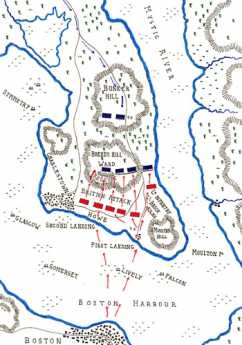
|
| Bunker Hill |
At that time, only a third of colonists were in favor of fighting about it, and a third was entirely opposed. Samuel Adams himself had written his supporters that it would be best to hold back until greater revolutionary support could be gathered. Unfortunately, in the minds of the British ministry, hostility had already escalated irrevocably when the Continental Congress in June 1775 created the Continental Army and dispatched George Washington to Boston to join the fight. This was probably the moment when war became inevitable in the collective mind of the British Parliament; a full year had passed since then. Regardless of Bunker Hill, the British were incensed by the creation of the Continental Army, and passed the Prohibitory Act, which declared that all thirteen colonies (belonging to the Congress) were renegades, their decision to raise armies placing them "outside the protection of the king". All American shipping was now subject to seizure, not just that of Massachusetts, as were foreign vessels engaged in American trade. News of this Parliamentary thunderbolt first came to Robert Morris through one of his ships, accompanied by news that 26,000 troops had been raised for an invasion of American ports. The British position was that all thirteen colonies had gratuitously formed a government and an army, and needed to be punished for such treason. Pennsylvania was no exception; the offending Continental Congress had met there, and Benjamin Franklin had represented both Massachusetts and Pennsylvania before Parliament. Confirmation of that particular British attitude toward them greeted Pennsylvanians when British warships promptly appeared in May 1776, to patrol the mouth of Delaware. Three cruisers exploring up the river were attacked by American galleys. In response, the cruisers sailed directly at Philadelphia until they were finally beaten back by citizen flotillas, supervised by Robert Morris and the Committee on Safety. Morris wrote to Silas Deane in Paris that war was probably inevitable. Far less tentatively, the British felt it had already been in progress for a year.
The British Ministry had probably been unreasonably hostile, but they were not unanimous and they were not fools. In response to colonial unrest up until these almost irretrievable events, the British were concentrating on depriving the colonists of arms and gunpowder, mostly avoiding direct violence; it seemed an effective strategy. During the Boston Tea Party, for example, British warships in Boston harbor merely stood by and watched the fun. Although gunpowder was a simple chemical, comparatively easy to make, it was less likely to blow up in your face if finely ground and milled in a major factory; for a real Colonial war it had to be imported. The British strategy had been: Take away their weapons, and they will capitulate. Unfortunately, that was not the response at all, since even loyal colonists felt they needed good gunpowder for hunting and self-protection. Gunpowder blockades and confiscations were going to be bitterly resented. Nevertheless, British patience with the colonists was probably only irretrievably exhausted in June 1775, when the Continental Congress formed its own army and Washington marched them to Boston. If Pennsylvania became convinced of that inevitability, the war was certainly on. After the naval battles right here on Delaware, what really became hard to believe was that -- only a week earlier -- Pennsylvania's moderate voters had soundly defeated the revolutionary radicals in an Assembly election.
Pennsylvania had indeed been far less eager to fight than Massachusetts and Virginia, but the more belligerent colonies felt they needed allies in order to prevail. In the Continental Congress Pennsylvania and South Carolina voted against rebellion in the Spring of 1776; and in the May 1776 election where independence was the main issue, the Pennsylvania voters elected an Assembly 70% opposed to rebellion, including that eminent merchant Robert Morris. Some of the determined Massachusetts efforts to persuade the Mid-Atlantic colonies bordered on subversion, but Pennsylvania remained unmoved. Nevertheless, they could see a real danger of war and had approved Secret Committees to be prepared if it came. Robert Morris was ideal for covert activity and could be expected to keep the activity under control, along with Benjamin Franklin and several prominent merchants. Morris made no secret of his affection for England the country of his birth, or of his membership in the John Dickinson group which hoped economic pressures would suffice. When the Secret Committee chairman suddenly died of smallpox, Morris was then appointed a chairman. His personal integrity was widely respected; in several hotly contested elections, he was nominated by both the radicals and the conservatives.
 It seems absolutely necessary to prepare a vigorous defense since every account we receive from England threatens nothing but destruction. 
|
| Robert Morris: December 1775. |
The Secret Committee was charged with smuggling in some gunpowder, just in case. Several of the members agreed to ship arms and gunpowder in their own ships; there was no one else to do it. The decision to engage in treasonous gunrunning was greatly assisted by the unexpected appearance of two Frenchmen with aristocratic accents in a boat loaded with gunpowder, who proposed themselves as French counterparties in a major gunpowder and weapons smuggling network which did actually materialize. Just who sent them has never been made entirely clear, but later events make the playwright Beaumarchais a reasonable guess, acting as a secret agent of the French King. Beaumarchais the famous playwright had been caught in a police trap, and forced to act as a government spy; just whose agent he was is a little murky. The American merchants on the Secret Committee knew gun running was expensive for them; they all expected to be paid for dangerous work, so it was also profitable. And treasonous. If caught, there was every possibility of being hanged. Initially, the Americans all imagined the Frenchmen were simply in it for the money, and that is possible. Surprisingly, no one seems even to have speculated they were agents of the French government on a mission to stir up trouble against the English. Spies had surely informed the French King of approaching war, at least six months before the Americans knew of it. Since these two foreign shippers (giving their names as Pierre Penet and Emmanuel de Pliarne, and surely sent to spy) demanded to be paid in hard currency, Morris did send one ship with hard money to pay for munitions to be carried in its hold on the return voyage. But he soon devised safer payment approaches.
 For my part I abhor the name & the idea of a rebel, I neither want or wish a change of King or Constitution & do not conceive myself to act against either when I join America in defense of Constitutional Liberty. 
|
| Robert Morris: December 1775 |
Since he had agents and offices in most major foreign ports, Morris could arrange for the money to arrive independently of the cargo ships. Or better yet, send ordinary commodities on the outward journey and make a private profit on that, returning with munitions paid for by the "remittances" -- revenue from the other cargo. Money was also sent on other circuitous journeys and through other channels, particularly the discounted debt system he had earlier perfected when the paper currency had been prohibited. There was thus less incriminating evidence on the ship, and even if the ship burned or everyone got hanged, the money was at least out of the hands of the enemy. Secrecy was, of course, essential, this activity could be called treasonous, and it was most assuredly smuggling. When neutral countries were found supporting gunrunning, that assistance might well be called an act of war, so all nations prohibited it. In spite of his earlier reluctance about independence, Morris could easily see that gunrunning by the privateers of a recognized nation might be better protected by the conventions of war than exactly the same activity conducted by, say, brigands, profiteers or pirates.
Gunrunning was always seriously dangerous; Morris soon lost four ships, one by a mutiny of secretly loyalist sailors, and two were captured by unscrupulous American privateers. There would be some protection from hanging for gun runners as authorized combatants of a recognized nation. In retrospect, we can now surmise that Franklin was committed to independence, and was probably nudging his friend on the Secret Committee. John Adams could barely contain himself, openly and repeatedly. Washington was already outside Boston leading an army. The commitment had many levels.
In July 1776 Morris was called on to vote in Congress for the independence he always said he opposed. Caesar Rodney rode in from Delaware to deliver his state for Independence; now, Pennsylvania alone stood in the way. When the moment came, on the advice of Franklin, Robert Morris, and John Dickinson left the room to allow other Pennsylvania delegates to constitute a Pennsylvania majority, casting the state's vote for the war. Commitment to the war had many variants, even after the war began.
Constitutional Liberty
WITH British troops in the process of disembarking at New Brunswick, apparently intent on hanging rebels, Robert Morris and John Dickinson annoyed everybody by refusing to sign the Declaration of Independence. Both were fully engaged in the Revolution after the fighting finally got started, and Morris signed up in August 1776. Dickinson had some further reasons of his own, but Morris explained his position quite succinctly. He didn't mind being a British subject, he didn't want a new King, what he wanted was Constitutional Liberty. There is no record of his being directly confronted about this later, and thus no detailed explanation. But whatever did he mean?
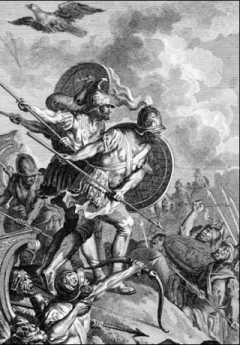
|
| Iliad and the Odyssey |
Morris was of course very bright, even brilliant as a businessman. He had an astonishing memory for detail and was capable of holding his own counsel. He was a person of great daring and prodigious amounts of work. But there is very little evidence that he thought it was useful to be mysterious, or deep. So why not take him at his word, which was essentially that what mattered in a government was whether it kept its promises and allowed its citizens all possible Liberty. It did not matter whether the government had a king, or seldom mattered much who that king was. What mattered was whether it kept its promises, and for that a Constitution is useful. There is no great pleasure in being capricious and arbitrary, so a king who leaves the citizens alone is mostly the best you can ask for. It does, however, help considerably if the rules are fair, clear, and binding. Beyond that, it is unwise to go about toppling governments in the vain hope that a new one is somehow better than the old one. This is putting words into his mouth, to be sure. What he did say was he saw no advantage to getting a new government when what we wanted was Constitutional Liberty. Eleven years later, he was a personal friend of just about everyone with the power to design a new government. Washington lived in his house, or in one next door. Ben Franklin was a business partner. Gouverneur Morris was his lawyer and partner. Just about everybody else who mattered was meeting with him in secrecy for months at a time, in the Pennsylvania Statehouse. And so on.
An essential part of this puzzle of Morris' role could be that the American Constitution was very close to unique in being written out as a document, like a commercial contract. The British Constitution was unwritten at the time and continues to be unwritten today. Many other members of the British Commonwealth operate without a written constitution. And in fact, what passed as constitutions for thousands of years have been unwritten; it was the written American one which was the novelty, not the other way around. It may stretch matters a little to describe the Iliad and the Odyssey as constitutions, but they do in fact describe the system of governance of the Ancient Greeks, clarifying many axioms of their culture for which they were willing to fight and die. We are able to understand the rules for Greeks to live by from reading Homer, almost surely better than we understand the rules of American culture by reading The Federalist Papers. Modern students of geometry, for another example, are taught that all the rules of Euclidian geometry are based on a few axioms stated at its beginning. Change one of those axioms, and you make mathematics unrecognizable. Even Newton's Principia are now seen by mathematicians to be rules which apply only to our universe for certain. There may exist many other universes to which they do not apply. Axioms are themselves mostly regarded as unprovable assumptions. A Constitution, therefore, is regarded in modern times to be much the same thing as a set of mathematical axioms. With one new exception: they are written out on a piece of paper for all to see and agree to -- just like a commercial contract. It would not be surprising to discover that America's great merchant trader, Robert Morris, was horrified at the idea of depending on Vestal Virgins or Judges, or Kings, for their recollection of what the contract says. It, therefore, seems quite natural for a maritime merchant to be agitated by having the rules of British society depend on what King George III chose to emphasize or ignore. Write it down, negotiate it, then tell us what you want so we can agree to it; that's a proper way to define Constitutional Liberty and limit disputes. International maritime trade could not be conducted in any other way, because sea captains who feel abused in a foreign port can abruptly up-anchor and sail away, never to return to that port again until or unless local rules are clarified.
Unless someone discovers some relevant documents in a trunk in the attic, that's about the best conjecture to be made about the American novelty of a written constitution, and its transformative effect on the legal system of all other nations which have one. It would still be nice to know, for certain, whose idea it was.
The Network
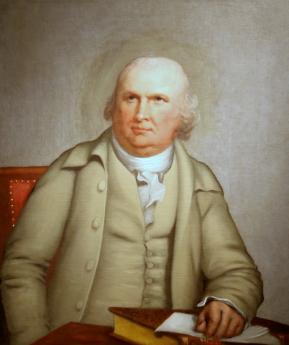
|
| Robert Morris |
It's true that Robert Morris had been engaged in smuggling gunpowder past the British blockade for more than six months before the 4th of July, 1776. It's also true he had found ways to make international payments in spite of a prohibition of paper money, which served well in a wartime freeze of money transfers. Still, his establishment of an effective way to wage maritime war in only two or three months is an achievement that is nearly miraculous.
Essentially, he shipped normal commercial cargo out, bought munitions with the revenue, and sailed the ship home loaded with gunpowder and guns; his firm made a profit on the outgoing shipment, and the government paid for the return trip with munitions. Because of the pre-war blockade, the commercial trade was badly needed, and extremely profitable. He wrote to one agent that one shipment which was successful would pay for 2,3, or 4 losses. That's a pretty cold-blooded way to describe 2,3 or 4 ships lost with all hands, but sometimes the sailors were only captured and imprisoned.
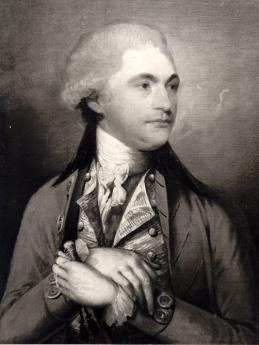
|
| William Bingham |
The system needed to find a way to make the exchange between guns and butter safer and more devious, so the ships leaving American ports would mainly sail to the Caribbean, to New Orleans, or to France. Sometimes transfers were made in North Carolina. At first, almost any cargo was highly profitable, but in time the main cargo was tobacco, highly desirable in Europe. New England had very little trade, so its ships were directed to Southern ports, and then took up the trade to some other transfer destination. New Orleans was in the hands of the Spanish, so negotiations were tricky. Caribbean areas had numerous ports, but plenty of pirates and/or privateers, as well. William Bingham was dispatched by Willing and Morris to Martinique and proved to be a master of the business. He added privateering to the list of his activities, paying to have ships built and then going shares with an enlisted crew. Their technique was to approach a British ship and take it as a prize. If on approaching the ship they could tell it was a British naval vessel, they ran up a French flag and headed for port. Bingham often was able to persuade the crew of a captured vessel to join him, and so the number of his ships and the number of British captures multiplied rapidly. By the end of the war, he was able to return to Philadelphia at the age of 28, temporarily the richest man in America.
Another source of privateers was the Pine Barrens of southern New Jersey, where the Willing and Morris firm itself was able to oversee the construction of vessels, the recruitment of crew, and the sharing of spoils on return to home port. The winding creeks behind Barnegat Bay were places the British soon learned to fear. One cannon on a river bend could suddenly stop any invaders. Enormous amounts of British shipping and British seamen were lost to American privateering, probably inflicting more British casualties than Washington's army.
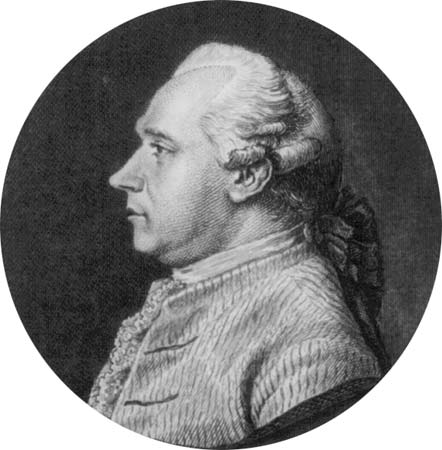
|
| Silas Deane |
The ultimate main source of munitions was France. To the end, the French regarded the Revolutionary War as one fought between the French and the British, with Indian and colonial allies. Morris sent Silas Deane of Connecticut over to France to see if he could make connections, but he immediately found the French were ahead of him. The French King was immediately willing to advance 200,000 livres in loans, and Vergennes the foreign minister was prepared to clear up any difficulties that might arise with local police, customs and other French officials who were uninformed about the realities. And above all, Beaumarchais was in charge of local arrangements, to be sure gunpowder and guns were available in the right amount at the right places, and that local outlet was located to dispose of tobacco and other products coming in to pay for the munitions. Beaumarchais seemed to believe he had thought up this whole arrangement, and perhaps to some degree, he had. In any event, there was no problem persuading France to get involved. After a while, the enterprise was so successful the French began to fear it would bankrupt them, but that is another story. As is the notion that in 1783 the French were preparing to make a separate peace with the British, and thus to leave the colonists hanging. So to speak.
REFERENCES
| The Pine Barrens: John McPhee: ISBN-13: 978-0374514426 | Amazon |
Beaumarchais: A Playwright Brings France into the American Revolution
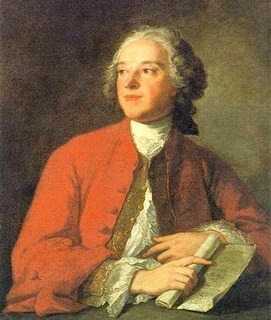
|
| Pierre Augustin Beaumarchais |
Pierre Augustin Beaumarchais, the son of an 18th Century French watchmaker, was born Protestant in a Catholic country. While possibly inclined by this circumstance to be a free thinker, his unusual artfulness was more likely inborn. After revolutionizing watchmaking before he reached the age of twenty, with an escapement mechanism for small portable watches, he rose to social attention when the Royal Watchmaker claimed the invention was his own, and Beaumarchais sued him. Thus gaining Louis XV's notice, Beaumarchais became Royal Watchmaker himself. He was soon giving harp lessons to the ladies of the court, writing plays like The Barber of Seville, and engaging in business schemes with wealthy investors. His career as a court favorite lasted sixteen years, first bringing him considerable wealth, but then sudden ruination by a lurid lawsuit which cost him his fortune. In brief, Beaumarchais had tried to bribe a French judge with less money than his opponent offered, and so spent a few months in prison. After concluding a long, public battle through the appeals courts, he sought a more political role with the new young King, Louis XVI. He was sent to London to pay off a former French Agent, Chevalier D'Eon, who was blackmailing the French government. D'Eon's social connection to John Wilkes, the outspoken critic of the British King, sparked Beaumarchais' initial interest in Whig politics and the American rebellion.
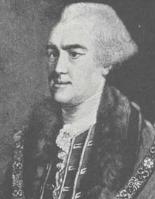
|
| John Wilkes |
When he arrived in England Beaumarchais found British politics in turmoil; John Wilkes headed a whiggish opposition movement denouncing Royal authority and hosting gatherings of the like-minded, some of which Beaumarchais attended. Fueling these domestic British flames of liberal reform was the recent and increasingly serious rebellion on the other side of the Atlantic. As Beaumarchais spent more time in England discussing the rebellion with Virginian Arthur Lee (who highly exaggerated its strength), he became increasingly convinced it would be a good strategy for France to help the colonists. For all the trouble Arthur Lee ended up causing, he can fairly claim credit for enlisting Beaumarchais to French support for the American cause.
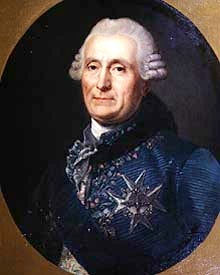
|
| Charles Gravier, Comte de Vergennes |
Beaumarchais reported his findings to Charles Gravier, Comte de Vergennes, the foreign minister of France. He urged the French government to support the American rebellion, consistently taking the line of French self-interest; after suffering a humiliating defeat in the Seven Year War, France might now undermine England's growing regional power by helping the colonists loosen their affiliation to the rising island empire.
When the young and hesitant Louis XVI finally agreed to take Beaumarchais' advice, it was still unclear whether the American rebellion was a serious movement. The French monarchy was not ready to unsettle its already shaky relationship with England by coming out in public support of untested rebels. To preserve the appearance of neutrality, the French Government loaned Beaumarchais one million lives in June 1776 to start a private trading firm, the Rodriguez Portales Company. This new firm would buy old French military supplies from the French government, then re-sell those supplies to the Americans with return payment of American products, primarily tobacco. Beaumarchais was therefore expected to run a completely self-sustaining operation, free from association with the French government. Rogue and adventurer that he was, Beaumarchais took on this risky challenge with enthusiasm, working tirelessly in France and around Europe to provide the Americans with ammunition, military supplies, and food. His efforts did not go undetected, however. England's ambassador to France, Lord Stormont, grew suspicious of Beaumarchais' frequent trips across the channel and notified the French government of his displeasure. But Beaumarchais simply ignored these protestations.
Matching Beaumarchais' work in establishing Rodrigez and Hortalez, the American Congress sent a covert representative to nurture French support. Silas Deane, sent to France under the disguise of a colonial merchant in July 1776, learned of Beaumarchais' plan to support the American army and at first, the two became fast friends. Unfortunately, this friendship sparked the jealousies of Colonists and Frenchmen alike. Arthur Lee became a particularly vicious opponent of the Beaumarchais/Deane pair, resenting Silas Deane for having been chosen over him as a diplomat to the French, and suspecting Beaumarchais of money laundering. Even when he was later sent in company with Benjamin Franklin to continue negotiations with France, Lee remained suspicious of Deane and Beaumarchais' collaboration. The American mission to France during this period remains famous for strife and factionalism, which was as much a free for all as two-sided animosity. Personal ambition and cultural differences complicated these relationships; no one eventually suffered more because of it than Beaumarchais and Deane.
While Deane negotiated with Beaumarchais, Arthur Lee corresponded with Congress to undermine both Beaumarchais and Silas Deane. Lee was highly suspicious of both men, accusing them of using the privateering scheme for their own profit. The result was a split in Congress between those who supported Lee and those who supported Deane's work with Beaumarchais. The first congress was full of alliances, tempers and faulty information that led to frequent, if not constant, conflict. The Lee brothers were particularly vocal opponents of an alliance with France, and this opposition by a prominent family within the Continental Congress kept French and American relations strained and hesitant.
The first shipment to the colonies by the Rodrigez and Hortalez Company carrying nearly 25,000 pounds of ammunition, was a shaky and often blind operation. Continental Congress never received news of Deane's plans (and request for ships) and remained busy working away at a proposed Declaration of Independence, the publication of which would, with luck, ensure France's official cooperation. Deane was forced to make crucial shipment decisions without the support or approval of Congress. Adding to this instability, the ships were discovered by Lord Stormont right before the first shipment left for the colonies, and the English Ambassador to France quickly protested their sailing to the French government. Vergennes, eager to keep smooth relations with England, particularly in view of the seeming failure of the American cause at that time, officially banned their sailing off the French coast. Fortunately for the Americans, Beaumarchais sent the supplies anyway, which were greeted warmly by colonists in Portsmouth, New Hampshire in early 1777. These supplies helped the colonists win the Battle of Saratoga, the success of which finally convinced the French to emerge in full support of the American Revolution. Beaumarchais continued to supply the Colonists despite England's protests, but privateering increased the threat of war between England and France.
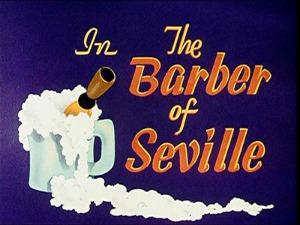
|
| Barber of Seville |
By September 1777, Beaumarchais had shipped 5 million lives worth of supplies to America without repayment. By 1778 his firm had accrued so much debt that by the end of the war it was in complete ruin. The French government was unwilling to acknowledge its support for Beaumarchais before or after the war, and Silas Deane's entreaties were, unfortunately, not enough to convince Congress that the American colonies owed Beaumarchais for his generous work. Beaumarchais continued his requests for compensation after the war, and Congress continually refused or ignored these requests. Thirty-six years after his death, his heirs were paid back a small fraction of the original debt. Forced to travel to Congress to fight their ancestor's case, his descendants were awarded 800,000 lives of the several million owed. In effect, Beaumarchais nearly single-handedly supplied the American Revolution with arms receiving very little in return except his financial ruin.
It is surprising that a man with so much talent and character should have died in near obscurity; yet Beaumarchais' plays, not his political maneuverings, are what have survived today as part of the standard repertory. When his wildly successful The Barber of Seville premiered in 1775, Beaumarchais was already a well-known playwright and champion of the down-trodden common man. Perhaps he was too great for his own time; The Barber proved more popular when adapted into a libretto by Lorenzo Da Ponte and then later into an opera by Gioachino Rossini in 1814. An independent mind and flamboyant character immortalized his art, but the same characteristics may have brought him, and France, to political and financial ruin.
Richard Henry Lee: A Pennsylvania Viewpoint

|
| Patrick Henry |
Although Colonial Massachusetts was combative and outspoken in its demands for liberty, somehow, pacifist Quaker Pennsylvania still got along with Bostonians reasonably well. It was Virginia that was always in Pennsylvania's face, proud, loud and defiant. Patrick Henry was certainly one of Virginia's leaders, but most of the time it was the residents of Westmoreland County VA who wrangled with Pennsylvania, people with names like Washington and Lee. Some of this animosity had to do with competition for access to the Ohio territory through Pittsburgh, some of it was a strong difference in attitude toward the Indians, whom the Quakers sought to treat as equals. Eventually, there was a division over slavery. Arthur Lee had attended Eton College no less and was often the agent who acted out the repeated efforts to stir Pennsylvania from its torpor about rebellion against England. But very likely it was his brother Richard Henry Lee who schemed the most.
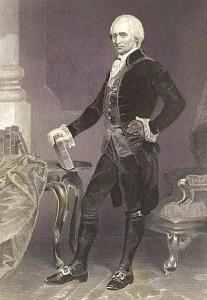
|
| Richard Henry Lee |
Richard Henry Lee was the author of the Westmoreland County Resolution of 1765, which essentially proclaimed to the neighbors that anyone who cooperated with the Stamp Act was going to be sorry about it. It was the same Richard Henry Lee who introduced the Virginia Resolution of June 1776, declaring that:
Americans are and of right ought to be, free and independent States, that they are absolved from all allegiance to the British Crown, and that all political connection between them and the State of Great Britain is, and ought to be, totally dissolved.
Hotheads of Virginia and Massachusetts formed a political group at the Continental Congress, usually referred to as the Eastern Party. The leadership of a Moderate Party was less clearly defined, but Benjamin Franklin, John Dickinson, and Robert Morris probably qualified. It was almost pre-destined that Morris and Franklin would have trouble with the Lee brothers, especially when Arthur was the spokesman and Richard Henry the ringleader. Like cats and dogs, they seemed to have been some sort of genetic antagonism; topics under dispute tended to vary. No doubt, Robert Morris' enormous wealth and the ease with which he accumulated, even more, irritated the Virginia gentry whose tobacco farms were starting to exhaust their topsoil. For his part, Morris was not likely to be deferential, merely to their ancestry. Morris did sign the Declaration of Independence a month late, but under the circumstances, he could no longer vote for it; Richard Henry Lee had written the Virginia Resolution which glorified the very crux of it. A Secret Committee was soon formed to obtain arms and gunpowder, including Morris and Franklin; Richard Henry Lee saw to it that his brother Arthur was added. When Arthur was sent to watch out for Morris' agent Silas Deane in Paris, Arthur got sent along to stand guard, stirring up endless trouble with Foreign Minister Vergennes. When the Lees finally caught on to the system of sending American products to France on ships that would return with gunpowder, they wanted Franklin removed, Robert Morris' brother Thomas removed, and another Lee brother William added to the group in charge of exchanging goods with the Frenchman Beaumarchais, who was a particular Lee favorite. When Beaumarchais indicated a strong preference for tobacco as the product most in demand in France, it must have set off bells in Richard Henry Lee's head. The Lee home region of Westmoreland County in Virginia dominated the tobacco trade. But Robert Morris was himself a second generation tobacco trader; the Lees had little new to teach him about tobacco. Time and again, Morris defeated the Lee brothers in some such petty quarrels. Gradually, the Lees lost credibility, particularly after scholars began to discover evidence that when the Stamp Act was enacted, Richard Henry Lee had applied for the job of a local agent, and had been rejected.
The Lees were not always in the wrong. Thomas Morris was indeed a hopeless alcoholic and an extreme embarrassment to Robert. But a more fraternal relationship might have led to Lee helping Morris ease Thomas out while concealing his indiscretions; he could have made a friend of Robert Morris for life. Morris was certainly willing to play this game; he praised Arthur Lee in public for his assistance in monitoring the secret committee, a description which at this distance is simply hilarious. John Adams in Paris might be forgiven for taking Puritanical offense at Ben Franklin's exuberant Parisian high life. It is likely the Virginia Cavaliers looked at dalliance through the same lens as the Adams family, disliking Franklin and Morris for having a jolly time, and worse still being acclaimed for it.
Christmas, 1776, Behind the Scenes at Trenton
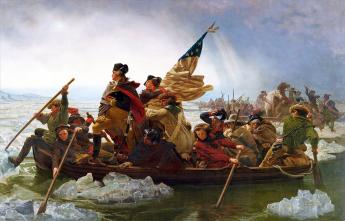
|
| Washington Crossing Delaware |
Cornwallis and the British regulars came thundering down the narrow waist of New Jersey from New Brunswick to Trenton, just before Christmas, 1776. Washington's troops retreated before them, fleeing to the Pennsylvania side of the Delaware River. The British then fortified the Hessians in Trenton and went back into their own winter quarters nearer New York. Plenty of time seemed available to finish off Washington in the Spring, and then leisurely conquer the enemy's capital in Philadelphia. The Continental Congress thought so, too, and moved its capital to Baltimore. Only three members of the Congress, Robert Morris, George Clymer, and George Walton (of Georgia), remained in Philadelphia to run the government; Morris was essentially in charge, in the role of financier whatever that meant. With Congress seeking refuge, Morris was for practical purposes, acting President of the United States. Washington swept up all of the boats on Delaware, set up camp on the Pennsylvania side, and begged Morris to get him some money to reward re-enlistments by January 1. Others saw the end of the year as Christmas time; Washington saw it as the end of the year when enlistments expired. He quite plainly stated that it was all over for the Continental Army unless he could get some hard currency, silver preferred, to show the troops that the rebellion could survive another year. About ten dollars per soldier would probably do it, but then there was also a need for hard money to buy food and supplies for the starving troops.
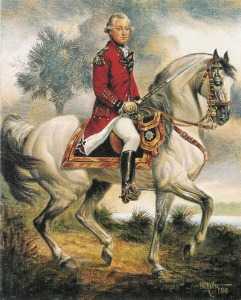
|
| General Charles Cornwallis |
Just how Morris managed to find the money is unclear, or how much of it was his own. But he did manage, with the lucky arrival of a gunpowder smuggling ship from France, and eighteen cannon somehow supplied by General Knox. The Colonials rallied to re-cross Delaware, surprise the Hessians, outmaneuver Cornwallis as he once more thundered back down the New Jersey waist, now intent to wreak vengeance. The military essence of it all reached a climactic moment when Washington used fake bonfires to trick the British while he sneaked around them. Captain Sam Morris and Philadelphia's First City Troop managed the bonfire deception. When cannon fire in Princeton announced the trick, the British raced back to their ships at Staten Island to protect their supplies before Washington who now had a head start, could get to the ships, leaving the British to starve in the woods. Both sides were exhausted by the chase, and although he had won this race, Washington had to retreat to winter quarters in Morristown, New Jersey (named after a former New Jersey Governor.) Meanwhile, with Congress taking refuge in Baltimore, Philadelphia was nearly deserted except for some Quakers who felt they had no quarrel with the British. And Robert Morris, who continued to run his smuggling operation with Beaumarchais the famous playwright on the French end of it. Tradition has it that some Quaker gardens were dug up to find enough silver to reward reenlistments, and if so it is unclear how much was freely contributed and how much was just plain stolen; indeed, how much of it might have been Morris' own money. By the next fall, Washington was able to fight the largest battle of the war at the Brandywine Creek, so Morris must have been very active smuggling guns and gunpowder to resupply the Colonials during that intervening winter and spring.
During periods of the lull in infantry warfare, other warfare including privateering at sea, blockades, and the diplomatic intrigue in Paris, were unmerciful. If Washington's army had been wiped out, the Revolution would have ended. But other misadventures might have ended it as well. The colonists were demoralized, and their dismay was summarized by a letter from Morris to Silas Deane, a line of which was the bitter observation that "Sorry I am to say it, many of those who were foremost in noise, shrink coward-like from the danger.".
A few days before that fateful Christmas, Ben Franklin had arrived in Paris to take over our diplomatic mission with the French. When the news of Washington's victory reached him, the new American arrival was being acclaimed as the world-famous scientist and witty author and was thus in a position to make the most of it with the French court. He may be forgiven for exaggerating Washington's exploits a little. The Trenton victory was rough and ragged, but it would serve. Washington, Franklin, and Morris. The three Americans who mainly won the Revolutionary War for us now took the stage, front and center.
Fort Wilson: Philadelphia 1779
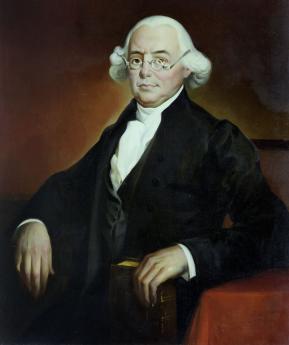
|
| James Wilson |
OCTOBER 4, 1779. The British had conquered then abandoned Philadelphia; an order was still only partially restored. Joseph Reed was President of the Continental Congress, inflation ("Not worth a Continental") was rampant, and food shortages were at near-famine levels because of self-defeating price controls. In a world turned upside down, Charles Willson Peale the painter was a leader of a radical group of admirers of Rousseau the French anarchist, called the Constitutionalist Party, leaning in the bloody direction actually followed by the French Revolution in 1789. Peale was quick to admit he had no clue what to do with his leadership position and soon resigned it in favor of painting portraits of the wealthy. Others had deserted the occupied city, and many had not yet returned. The Quakers of the city hunkered down, more or less adhering to earlier instruction from the London Yearly Meeting to stay away from any politics involving war taxes. About two hundred militia roamed the city streets making trouble for anyone they could plausibly blame for the breakdown of civil order. Philadelphia was as close to anarchy as it would ever become; the focus of anger was against the pacifist Quakers, the rich merchants, and James Wilson the lawyer.
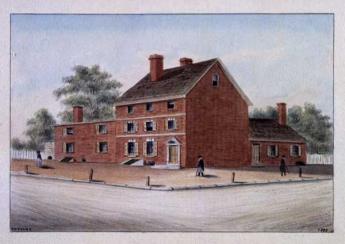
|
| Fort Wilson |
Wilson had enraged the radicals by defending Tories in court, much as John Adams got in trouble for defending British troops involved in the Boston Massacre; Ben Franklin advised Wilson to leave town. It is still possible to walk the full extent of the battle of Fort Wilson in a few minutes, and the tourist bureau has marked it out. Begin with the Quaker Meeting at Fourth and Arch. A few wandering militiamen caught Jonathan Drinker, Thomas Story, Buckridge Sims, and Matthew Johns emerging from the Quaker church, and rounded them up as prisoners. The Quakers were marched down the street for uncertain purposes when the militia encountered a group of prominent merchants emerging from the City Tavern. Unlike the meek Quakers, Robert Morris and John Cadwalader the leader of the City Troop ordered the militia to release the prisoners, behave themselves, and disperse; Timothy Matlack shouted orders. It was exactly the wrong stance to take, and about thirty prominent citizens were soon driven to retreat to the large brick house of James Wilson, at the corner of Third and Walnut, known forever afterward as Fort Wilson. Doors were barred, windows manned, and Fort Wilson was soon surrounded by an armed, shouting, mob. Lieutenant Robert Campbell leaned out a third story window and was soon dropped dead by a lucky bullet. It remains in dispute whether or not he fired first. Crowbars were sought, the back door forced open, but the angry attackers scattered after fusillades from inside.
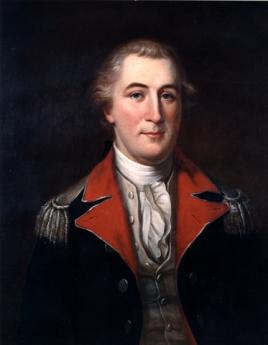
|
| Joseph Reed |
Down the street came President Reed on horseback, ordering the militia to disperse, with Timothy Matlack at his side; both men were well-known radicals, here switching sides to maintain law and order. The City Troop arrived, an order was given the cavalry to Assault Every Armed Man. The radicals were finally dispersed by this makeshift cavalry charge, cutting and slashing its way through the dazed militia. When it was over, five defenders were dead and about twenty wounded. Among the militia, the casualties were heavier but inaccurately reported. Robert Morris took James Wilson in hand and retreated to his mansion at Lemon Hill; Wilson was the founder of America's first law school. Among other defenders huddled in Fort Wilson were some of the future framers of the Constitution from Pennsylvania: General Thomas Mifflin, Wilson, Morris, George Clymer. Equally important was the deep impression left on radical leaders like Reed and Matlack, and Henry Laurens, who could see how close the whole war effort was to dissolution, for lack of firm control. Inflation continued but the center-productive price control system was abandoned and never revived; the Patriots had a bad scare, and the heedless radicals forced to confront the potentially disastrous consequences of their own amateur performance when entrusted with the power and responsibility they had just been demanding. It was one of those rare moments in a nation's history when the way suddenly opens to previously unthinkable actions.
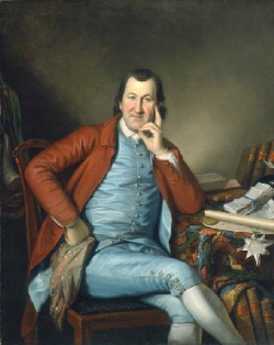
|
| Timothy Matlack |
The Battle of Fort Wilson was the only Revolutionary War battle fought within Philadelphia city limits; a revolution within a revolution, every participant was a Rebel patriot. Reed and Matlack were the two most visibly appalled by the whole uproar, forced by circumstances to attack the forces of their own political persuasion. But it seems very certain that Robert Morris and the other prosperous idealists were also left with an indelible conviction that even a confederation must maintain central command and discipline with an iron will, or all might be lost. A knowledgable French observer estimated that Robert Morris then owned assets worth eight million dollars, an almost unimaginable sum for the time. But he would lose every penny if effective political control could not be restored. A few days later in the October election, he and all the other Republican (conservative) officials lost their seats. It did not matter; Morris then knew what to do, and his opposition didn't.
Robert Morris, In Charge By Popular Demand
Robert Morris was in charge of the nation's finances (his title was Financier) for two intervals following two landmark emergencies: the Battle of Fort Wilson was one, and the threatened mutiny of the Pennsylvania Line of the Continental Army was the other. There was an interval without Morris in office in 1780. Both emergencies grew out of monetary panics, so a financial leader seemed a natural choice. Morris was in fact in charge of almost everything non-military, for the peculiar reason that we had no designated chief executive. The Continental Congress had a President, but the activities of the country were actually run by congressional committees. Morris wasted no time replacing this system with permanent departments under his supervision, so it is not too much to say his wartime role was acting chief executive. The improved efficiency of this approach was so evident the Constitutional Convention of 1787 seems to have spent little time arguing against continuing it, although lurking anti-Federalists never got over the idea that something had been put over on them. For reader convenience, we here take mild liberties with the chronology of individual initiatives, preferring instead to center around the two crises. The first of these, immediately following the Battle of Fort Wilson, was worthless paper money ("not worth a Continental") inflation, with soaring prices, futile price controls, and consequent false shortages of necessities. The second episode followed the later near-revolt of the Continental Army, and it was essentially a deflation provoked by the French running out of money to support us, and real shortages of necessities. Here, Morris had to cope with the end of the war in sight, but in fact not ending. Everyone was reluctant to fight battles without military purpose but unable to return to farming. Credit and hard currency reserves were exhausted. At the same time British, French and American politicians connived for advantage after a war each had failed to win militarily. By this route, having earlier described the creation of modern banking, we arrive at the cluster of clever expedients which Morris handled like a juggler as he raced from inflation to deflation, and back.
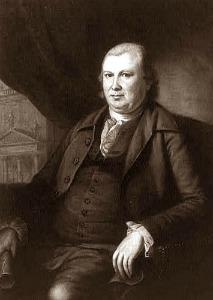
|
| Robert Morris, Financier |
The revolt of the Pennsylvania Line, along with Washington's clear sympathy for his soldiers, threw the Continental Congress into a panic. Their own responsibility for the crisis, as well as their lack of any clear idea about what to do about it, were as obvious to the public as to themselves. The approaching result went beyond a mere disgrace, and might even lead to a dictator, or God saves us, another king. A decade later, this crisis might have suggested to some that a guillotine should be set up behind the State House on Chestnut Street. Indeed, Thomas Jefferson made some remarks which might be taken in just that way. The soldiers themselves put an end to that sort of wild talk. British General Clinton sent some emissaries to the American Army, looking around for some deserters to turn Tory. The soldiers promptly executed the emissaries. George Washington, Morris' best friend, played his ambiguous position like a master. He was ultimately responsible for maintaining order, but his sympathies with the soldiers' complaint were obvious. Calling the officers together, he made the theatrical gesture of pulling off his glasses, intimating that he was going blind in his nation's service. Since his eyes served him very well for the next decade, that was unlikely. Although it is possible he believed what he was saying, most certainly the officers did.
What helped the perplexing monetary situation most was the ready availability of a financial genius to turn it around; there was no real need for others to understand it. Robert Morris had made his pile, probably the richest man on the continent, and he had the grievance of having been rejected from office after the Battle of Fort Wilson. He also had the perfectly normal motive of wishing to hold things together until the Paris peace negotiations could restore order. He had some novel plans which he wanted to try; it is not too much to surmise he wanted to show them off, particularly since their central feature would require his prodigious energy, applied to his seemingly unlimited succession of ingenious solutions. No one else even came close.
At this critical moment, Morris played coy. He was not so sure he would accept the office of Financier, a term newly invented for the occasion. Accepting Ben Franklin's cynical assessment of the future, he wanted everyone to be clear that he was going to retain his private partnerships. And he insisted on his right to hire and fire anyone he pleased within the government bureaucracy who was concerned with public money. He would accept responsibility for new debts of the government, but not for old debts which were incurred before he took office. He would delay taking the oath of office for a few months. These conditions generated a storm of opposition in Congress; Morris was serene about that, and Congress finally agreed to his terms. Most of these terms had an obvious purpose, making no secret of his distrust of Congressmen. However, the opposition might have hardened its position if the purpose of delaying the oath had been fully expressed. Morris wanted to delay becoming a federal officer in order to delay resigning from the Pennsylvania Assembly. During the interval, he applied the same power tactics to the Legislature, ending up in charge of administering state finances in parallel with his federal duties.

|
| Yorktown: Oct. 19, 1781 |
The purpose was soon to emerge, as just one instance of a general approach. As inflation tossed and turned the finances of just about everyone, Morris would buy with one currency and sell with the other, taking advantage of transient fluctuations in their respective values, then quickly reverse the currency transaction when the advantages shifted. He arranged with the French and Spanish ministers to keep their loans and foreign aid in separate accounts, doing the same thing with state accounts, and even near and distant counties within Pennsylvania. He thus had his choice of a number of currency values at any one moment. His far-flung commercial network supplied him with more precise information than his counterparties could get, and usually more quickly, so his trading activities were quite profitable. One rather extreme example was the arrangement with Benjamin Franklin in Paris; he would write checks to Franklin in one currency while Franklin would write identical deposits back to him on the same day but a different currency. He thus expanded ancient practice among international merchants. Carrying it over to government operations had the effect of creating a modern currency market. To outsiders, however, particularly his political enemies in Massachusetts and Virginia, it looked fishy. To modern observers, the astonishing thing was his ability to keep such complexity in his head. The political class which even today sees it as natural that governments might want to manipulate currency as they please would regard Morris strategies as reprehensible. Those who believe the market price is the true price however, must applaud this strategy for forcing manipulated prices back to market levels. Since here has rested a central dispute in American politics for two centuries, Morris must at least be credited with inventing the dispute. One would normally suppose that doubling the silver price of American currency in two months would vindicate this trading strategy; but it has not, suggesting the nature of the opposition has been more ideological than economic.
Within days of assuming office, the "legal tender" laws were repealed, stripping government of the ability to force its citizens to accept the worthless currency, impose rationing and price controls or otherwise assume the pose of "sovereignty". Like a miracle, food began to reappear in the Philadelphia marketplace at a lower price, and confidence in the competence of government began to return. To whatever degree the British ministry had been deliberately stalling the peace talks in the hope of American collapse, even that incentive abated.
The list of financial innovations which Morris produced in a remarkably short time, is seemingly endless. He was central in the creation of the first American bank of the modern sort, the Bank of North America. And somewhere in the welter of activity appears to be the recognition of the so-called yield curve. Loans for a few weeks or months command a much lower interest rate than long-term loans; in the colonial period, almost all loans were for six months or less. Morris seems to have realized early that great profitability could be achieved by stringing a series of short loans into one long one. He thus devised a number of strategies which had the general effect of linking short loans together. Using the remittance for a transatlantic cargo in one direction as payment for the return cargo on the same ship was an early example. Once you grasped the idea and did it deliberately, long sequences of linked loans began to appear. Just to complete the thought, it might be noticed that globalization reverses the process with shorter-term loans for components rather than longer-term loans for the entire assembled product. With lower interest rates, prices can be reduced, unless a choice is made to increase the profits.
There's one last issue in Robert Morris folklore: Did he finance the Revolution out of his own pocket? The answer is surely no because Beaumarchais ended up spending much more than any other individual, although involuntarily. The degree to which hard currency originated with the French, Spanish and American governments is a little unclear, and war damages are impossible to summarize. There were moments when Morris did personally finance major cash shortages, adding the considerable advantage of speeding up what could be a cumbersome process of budgeting, committee consideration, disputes, and hesitation. Where it was feasible, he sought restitution. Every bureaucrat has experienced delays and obstructions he wished he could eliminate by simply paying for it himself; Morris had the advantage that in an extremity, he could afford it.
The more important contribution was his pledge to make good. Creditors generally preferred his credit to that of the government; his pledge was to make good if the government defaulted. His position was that of reinsuring government debts, or in modern terms offering the equivalent of a Credit Default Swap. If we lost the war and our debts defaulted, Morris would have lost everything he had. But short of that, his pledge would result in much smaller losses. The public couldn't be expected to understand all that, so some simplified explanations were understandable. There were probably a number of similar examples, but near the end of the war, there was a particularly clear one. The Continental Army was very close to revolt when it looked as though Congress would disband the soldiers without paying them; there was no money to pay them but demobilization would likely send rioting soldiers through the countryside. Morris came forward with a million dollars of his own money and saved the day. Washington was forced to make emotional speeches appealing to the patriotism of the troops, but with most of the army barefoot, that was not likely to suffice. Under those circumstances, to come forward like Arthur Lee and remonstrate that Morris had once refused to sign the Declaration of Independence, was ingratitude of the meanest sort.
The accusation made after the war was that he profited from government losses, but there has never been any evidence of that. His position was that he came out about even. Unspoken in these quarrels was the plain fact that until he got involved in the real estate boom, he didn't need to cheat. Probably didn't have time for it.
The Revolutionary War continued for two years after Morris took office, so war losses continued in spite of improved financial management. Both the French Government and the American one were at the edge of bankruptcy. Britain was also in political chaos, but it was small consolation that Parliament had granted Independence to the Colonies when George III was adamant and intransigent in his opposition to any such idea. Strengthened by the British defeat of the French Caribbean fleet, the capitulation by the Spanish about Gibraltar, and great uncertainty about the Crimea and India -- almost anything was possible. Eventually, matters were deteriorating again. The British had the financial strength to hold out much longer, but the neglect of other opportunities eventually wore them down. Morris seemed to be winning, just by not losing.
In the midst of such anarchy, Morris had to admit his greatest failure as the Financier but was already formulating his plan for setting things on their feet. The Revolutionary War as seen by a financier had either been won by the British system of taxation or else lost by the American and French lack of such a system. It was irrelevant whether the War was described as a defeat for Britain or a victory; in Morris' view, the British had a good system and we had a poor one. No nation can finance a major war out of current receipts; you had to borrow. Your security for the loan was the economy of your nation. Even if your illiquid assets were adequate for the war, the banking markets regard your ability to pay cash for the interest on the loan as the only reliable test of your solvency. That is, a nation at war must have the ability to keep the bankers happy with regular interest payments. For that, a nation had to have a proven system of reliable taxation. Britain had it, and the American/French alliance didn't. Franklin's masterful diplomacy was just lucky enough to achieve permanent independence, but that wasn't good enough, we had to have a Federal tax system. And to achieve that, we had to have a new Constitution. Never mind that resentment about British taxes got us into this mess. Never mind the chaos of the Treaty of Paris. Never mind the war-weariness, bitterness, and destitution of the troops. Never mind that Morris was about to embark on one of the most mind-boggling real estate ventures in history, was going to go to debtor's prison, was going to engage in millions and millions of dollars of borrowing and restitution. Never mind. We needed a new Constitution, and we were going to get one. Think big.
Private Sector Disciplines Congress
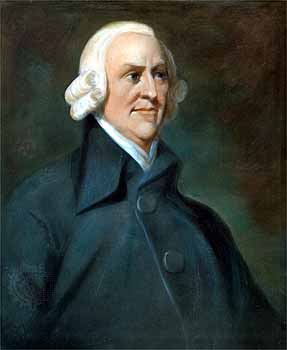
|
| Adam Smith |
Two centuries after our present narrative, when President William Clinton once proposed a financial adventure, Robert Rubin replied, "The bond market won't let you do it." In this way, the former Wall Street investment banker educated his politician boss that the most powerful wealth of any nation is hidden, locked up in homes, businesses, infrastructure, population education, and other long-term assets. Such wealth normally transforms into cash only when the Treasury borrows it (usually by selling government bonds) because by Constitutional intention the alternative of raising taxes is essentially confiscatory. By contrast, the use of bonds requires only an agreement on price. Bond use is thereby related to supply and demand, with the government generally selling bonds and the public generally buying them. The government sells as many bonds as it pleases, but the price received will immediately sink if too many bonds are for sale. Viewed another way, bond prices announce the market's daily assessment of probable government solvency because the isolated bond market is solely interested in the probability of being repaid.
 In modern wars, the longest purse must generally determine the event. 
|
| George Washington, May, 1780 |
In 1779 there was no bond market, so Robert Morris set about creating one. Acting then as only a private citizen, but faced with his government being run into the ground, Robert Morris proposed the creation of a "bank", the Bank of Pennsylvania, created, owned and managed by private citizens. The first bank in the nation didn't take retail deposits and was unlike banks we have today in other ways. Modeled more like a bond fund of the Twenty-first century, the Bank of Pennsylvania got its funds through fairly large subscriptions from wealthy people. Robert Morris himself was probably the heaviest subscriber. A bond market was thus created, with subscriptions flooding in when the public was pleased with its government, and flooding out when the public didn't like the looks of things. Naturally, there was a profit: the bonds the bank sold to subscribers were priced higher than the bonds the bank bought from the government. In this way, the public was assured the process of setting prices remained in neutral hands. The government could print bonds freely, but the Bank of Pennsylvania couldn't buy them unless somebody gave it some money, and that wouldn't happen unless prices rose to the "market clearing level," of agreement between potential buyers and sellers. The nature of the deal didn't change much when later banks got their funds from deposits, and one later enduring feature also didn't change: Governments hate banks because banks are in a position to frustrate governments intent on spending what they please.
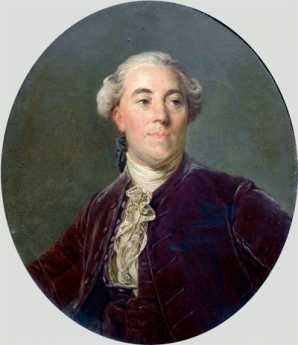
|
| Jacques Necker |
Quite soon, the public could be visualized as composed of debtors and creditors; the two main political parties have mostly had a matching composition. Progressive politicians, like Albert Gallatin, Thomas Jefferson, Andrew Jackson, Robert LaFollette, William Jennings Bryan, Woodrow Wilson, and Barack Obama have demonized banks, often threatening to nationalize or eliminate what is basically a neutral bookkeeping function. Adam Smith had written The Wealth of Nations three years earlier; Morris gave copies to friends and had obviously read the book, as had Alexander Hamilton. Morris also entered into exciting correspondence with Jacques Necker, the Swiss/ French banking genius, but Necker soon died, leaving it uncertain how much influence he had on America. This group of people gave us a system in which the public markets set the price of a currency, not the other way around. In the 1779 case, galloping inflation quickly came under control and goods soon reappeared in the markets, although the continuing war exerted relentless pressure until 1783 for the government to do more borrowing.
|
||
In another irony, during the year he was totally out of office (conservatives were restored to power in the October 1780 election), Morris enjoyed his greatest personal prosperity and exerted almost total personal control of the currency; it was fruitless to accuse him of using government office for private gain when he held no office. During this brief interval, Morris also created the first American corporate conglomerate, the series of partnerships called Peter Whitesides and Company. At least as profitable were his personal relationships with the French Ambassador Luzerne and the emissary from Havana, Juan de Miralles, who introduced him to large pools of investment capital from abroad. His American businesses became almost too numerous to count, again highlighting his prodigious ability to work. Meanwhile, his social life was as active as anyone's, extending his hospitality and affability world-wide, and anticipating a return to public life. All of this took about a year.
During this period, his sole civic activity was the Bank of Pennsylvania. As a bank, it had a relatively short life. As a subtlety of government, it would be hard to find its equal in any other empowerment of the people. Many centuries of history had formerly taught the lesson that public office was the way to get seriously rich. Morris flaunted a brand new American banner: public corruption was a waste of time, like any other zero-sum game.
Robert Morris Invents American Banking
The finances of our new nation were subject to many violent swings from the day the British abandoned Philadelphia in 1778 right up to the end of the war in 1783, but things steadily turned for the better after Robert Morris took charge of the Department of Finance in 1780, and particularly a year later when he was given the confusing title of Financier. Those two-mile stones could be marked in another way; with the establishment of the Bank of Pennsylvania in 1780, and then a year later the Bank of North America. Both institutions were products of the Morris imagination, matching the evolving state of his thinking. But the politicians only permitted these innovations after bitter battles, so in a sense, they matched what he could accomplish politically, in two steps grudgingly forced on him by the world's reluctance to trust his ideas. It remains unclear which innovations originated with Robert Morris, and which ones were derived from the Swiss economist Jacques Necker, who had become the French Minister of Finance, or Adam Smith whose Wealth of Nations was published in 1776. There were obvious similarities in the approach of these men, and a means of communicating existed through Silas Deane in Paris. Curiously, Necker was primarily famous in Europe for shrinking the bloated and corrupt bureaucracy of French financial administration. It is not irrelevant that whenever clear thinking replaces floundering, waste and abuse begin to subside.
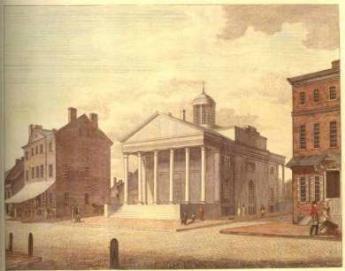
|
| The First Pennsylvania Bank |
The Pennsylvania Bank of 1780, unrecognizable today as a "bank", resembled a modern bond fund, operated as a partnership. It initially raised 300,000 pounds mainly from wealthy merchants, in return for interest-bearing 6-month notes. That money was promptly used to buy 500 barrels of flour for the troops at Morristown NJ. The bank thus served to transfer private funds to public purposes, which was what a rich nation urgently needs when its troops are starving.
It is always difficult to propose new ideas; in this case Morris also had to overcome resistance to taxes, which many citizens thought the Revolutionary war was all about. Taxation is, undeniably, a form of confiscation. When danger is clear at moments of panic, voluntary contributions may suffice; it is then almost sufficient to pass the hat. Soon enough, however, the government needs to increase incentives to induce the public to take the risk, hence interest rates offered by the bank must become market-driven, responding to negotiated public opinion. In short catastrophic wars for survival, a nation can gambles all its resources heedlessly. But steadily financing an eight-year war ultimately becomes a constant search for acceptable ways to transfer enough private wealth to cover the military effort, but not enough to stir up inflation. Floating interest rates, ultimately based on prevailing public opinion, do offer a match with changing prospects for victory or defeat, but only when they are not tampered with. Mismatches between public opinion and interest rates might seem tempting short-cuts to government, but they lead to inflation, price controls, rationing, and shortages of goods.
 There is nothing more difficult to take in hand, more perilous to conduct, or more uncertain of success, that to take the lead in the introduction of a new order of things. 
|
| Niccolo Machiavelli --The Prince |
In the United States in 1780, a huge disparity between the sudden wealth of privateers, and the abject poverty of Washington's army provoked trouble. At a time when the army was barefoot, Robert Morris' personal wealth was estimated at eight million dollars, but it seems likely the contrast between barefoot soldiers and free-spending privateer sailors was even more divisive since recruitment preferences were affected. The government tried many things: inflation default, devaluation default, confiscations, and even a few timid taxes. That duty was even proposed in Congress to be levied on the prize captures of privateers, suggests the public was alert to windfall profits. But it seemed oblivious to the principle that if you tax something, you get less of it; Congress was effectively proposing to punish the capture of British ships.
The idea of some sort of bank first came to Robert Morris less than a week after he stepped forward into the rioting streets to offer ten thousand pounds of his own money for assistance to the army, and induced several dozen of his friends to be similarly generous. It was not only necessary, but it was also nation-saving. In the previous ten months, the Continental dollar had been devalued forty to one, and then later 65 to one. No one would trust such a currency, whose consequence was certain to be a military disaster. But Morris obviously also knew that winning a war run by private subscription was unlikely to last much longer than one which depended on inflated paper currency and price controls. Petaliah Webster, a brilliant economist for the day, published pamphlets sarcastically comparing price controls to the religious conversion of a prisoner on a torture rack.
Therefore, passing the hat was also only an expedient. A week later Morris reorganized the concept to be The Pennsylvania Bank, where variable interest rates would induce reluctant lenders to lend. It was perhaps one or two steps better than losing the war, but it was primitive and limited. So, although Morris had originally opposed the war for independence, and the public certainly wasn't thrilled with taxes, market-driven interest rates were about all the Continental Congress would tolerate, as a compromise between confiscation and begging. The principle of free-market interest rates worked, in the sense that the army was able to fight on for several more years, but ultimately the soldiers revolted for lack of pay. It was notable that the Pennsylvania Line led the mutiny, or protest march, from Newburgh NY to the doors of Congress, and George Washington came close to giving the troops his tacit approval.
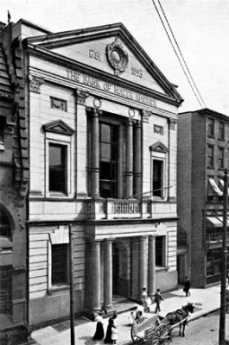
|
| The Bank of North America |
Well before matters came to that crisis, The Bank of North America, similarly attracting risk money by paying interest, was established in 1781 with an additional feature of generating side revenue through commercial 30-60 day loans. It was brilliant politics since Congress (with difficulty) agreed to permit a private company to engage in commerce but would never have tolerated the government doing so. When the goal is to transfer money from the private sector to the public one, the public insists on the ability to limit the amount. Otherwise, the transfer is a confiscation. Morris soon realized there was a missing third step. If the wealth of the nation was pledged to repay the war debts, creditors would insist on knowing the government's plans for repayment in case the bank couldn't do it. With the states retaining the right to tax but refusing the Federal government the right to tax without permission, the bonds of the Bank of North America were riskier for investors than they needed to be. In the difficult later years of the war, dependence on French loans began to look unwise, so the inability of the Federal government to confiscate private assets began to worry creditors. Somehow, Morris seemed to think the unratified Articles of Confederation were the problem and forced their ratification five years late. It didn't help matters, however, finally making it clear that the debt problem could not be solved without a new Constitution. When the soldiers did start to revolt, it became absolutely necessary to do something. Ultimately, the Constitutional Convention of 1787 was the result. In the meantime, the United States almost did collapse after the Battle of Yorktown (1783), and the French Revolution of 1789 is plausibly blamed in large part on our failure to repay the huge French financial support of our independence. A nation which pledges its full faith and credit behind war bonds must somehow convince its creditors that it intends to repay its bondholders, almost as fully as it intends to survive the war.
of pledging the full faith and credit of the nation through imposing taxes as lender of last resort. You don't need to pay for the whole war with loans, but you do need to reassure creditors that you will tax to repay your debts rather than default on them. That is, loan repayment is placed "ahead" of taxation. If even that structure proves inadequate, well, your war is simply not winnable because it provokes a dissolution of the government. The American public in 1781 did not need to understand the logic; it had just watched the process in grisly action. The public would not accept banks backed by federal taxation except as a wartime expedient, and therefore Robert Morris failed in his most important proposal. Although he continued to press for this essential feature for nine more years until it finally succeeded, a second near-miracle was that he kept the nation solvent in the meantime. He achieved this with a breath-taking combination of expedients, energy, ingenious fixes, and bluff. But the Treaty of Paris did not come a day too soon. In characteristic fashion, he did a quick about-face and proceeded to manage a huge personal fortune during a post-war convulsion.
In late 1779, before Morris would accept the job of rescuing the finances of the floundering new Republic, however, he meant to set some things straight. Congress must therefore first agree:
-- That Robert Morris would not accept the job unless Congress agreed that he could retain all of his private partnerships. Ben Franklin had warned him how ungrateful the public could quickly become, and what a short memory it had for those who performed favors. The Congress was infuriated by such demands, but Morris was adamant. Lucky for him that he was, because his enemies soon emerged with that age-old question, "Yes, but what have you done for us, lately? " -- That Morris has the power to dismiss any and all persons concerned with public finances and the public tender laws, for a cause. --That it was acknowledged that he assumed responsibility only for new debts, not those which preceded his taking office. -- That he has the right to delay taking the oath of office, retaining his seat in the Pennsylvania Legislature, until the relationship was clarified to give him effective control of state finances.
It can be imagined how displeased the Congress was with these high-handed stipulations, but they agreed to them.
Within three days of assuming office, -- Morris announced plans for the Bank of North America, our first true bank. -- Asked two personal friends, Thomas Lowrey, and Philip Schuyler, to buy one thousand barrels of flour on their own credit. He added, "I must also pledge myself to you, which I do most solemnly as an Officer of the Public. But lest you like some others believe more in private than in public credit I hereby pledge myself to pay you the cost and charges of the flour in hard money." -- Argued eleven points against the issuance of more paper money, particularly its requirement to be accepted as legal tender: "Because the value of money and particularly of paper money, depends upon the public confidence, and where that is wanting, laws cannot support it, and much less penal laws. . . Penalties on not receiving paper money must from the nature of the thing be either unnecessary or unjust. If the paper is of full value, it will pass current without such penalties, and if it is not of full value, compelling the acceptance of it is iniquitous." -- Arranged for the sale of western lands, to raise money. -- Acknowledged the Army was owed its back pay. -- Changed the War, Marine, Treasury, Foreign Affairs from committees of Congress to permanent departments.
Limits of Leverage
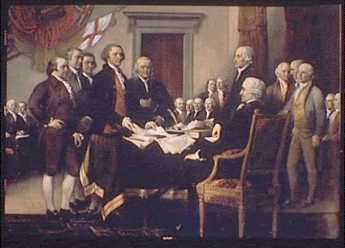
|
| Continental Congress |
PHILADELPHIA was the seat of the Continental Congress, hence the nation's capital, from 1774 to 1790, with two periods of abandonment. After the ratification of the Articles of Confederation in 1781, it became the Confederation Congress. When the British had occupied the city in 1777-78, "the Congress" fled to Baltimore, then to York, Pennsylvania, but returned as soon as the British left. The second period of the flight was occasioned by the near-mutiny of the Pennsylvania Line for lack of pay in 1783, when Congress fled, in succession, to Annapolis, Trenton, Princeton, and New York, leaving General Washington's loyalties torn between sympathy for his starving troops, and firm loyalty to law and order. The chaotic situation suited the British, who dragged out peace negotiations after the Battle of Yorktown and came close to winning by stalling what they had been unable to achieve by arms. The finances of the French government were already stretched beyond what was prudent in view of their intention to invade the British Isles. The much more solvent British began to see India as a more attractive colony than America, particularly if the lucrative trade with Jamaica and other Caribbean islands could be maintained without the expenses of the rebellion. Eight years is a long time for any nation to continue a war without generating significant unrest at home.
 The Constitution did not change taxation much; it changed the people who control our borrowing. 
|
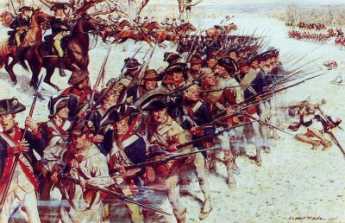
|
| Revolutionary War |
So, although the Revolutionary War was primarily started by British bungling which incited intemperate colonial hotheads into rash behavior, it was going to require a new Constitution and a realistic agreement about everybody's future, to achieve a workable peace. At the beginning of hostilities, only Robert Morris and John Dickinson talked as though they had done some clear long-term thinking, and they both opposed declaring Independence. They were shouted down and forced to go along or be banished. After eight years of fighting, however, a great many people could see that Dickinson may have been right to question the dubious unity of thirteen colonies, while a smaller group could even see that Morris might have been right to focus on Constitutional Liberty rather than regime change. Washington, although he was afraid of little else was fearful about his lack of education beyond grammar school; but at least he knew a country which would not feed its soldiers must be doomed to be no country at all. James Madison was scholarly and knew about Constitutions back to Aristotle, although events proved he had offered himself as a constitutional technician without clear personal goals for the product. Alexander Hamilton and Gouverneur Morris were adventurers, quite willing to shrug off the slogans of war and establish a king, that one form of government they were sure was workable. Only Benjamin Franklin among the colonists had stood before five kings, and of course before Vergennes and Wedderburn, where he could observe that all forms of government were in the hands of agents and intermediaries. But Robert Morris was a businessman who probably wanted little more than a workable set of rules, a level playing field, where he had every confidence that he would win, regardless of other rules for the game. Those rules at a minimum must include an equitable means for the government to pay its debts. As the richest delegate, in his own city, he was encouraged to act as a host for the convention. As host, he felt constrained to speak only about finance, his main concern anyway. Once this point was established fairly early at the Constitutional Convention, Morris had little else to say, even though he personally had many irons in the fire. Everything else, as politicians say, was for sale. Besides which he was accompanied by his personal lawyer but no relation, Gouverneur Morris, who was by far the most elegant speaker and persuasive advocate in the group.
Or perhaps the true flavor of his approach was, One Thing at a Time. Robert Morris was elected U.S. Senator from Pennsylvania in the first Congress under the new Constitution. He was in the center of almost every major debate, member of more than forty committees, often described as running on and off the floor, marshaling votes. The assumption of state Revolutionary War debts was perhaps part of his central drive to establish the full faith and credit of the United States. But the location of the new capital was quite a separate issue. Morris had bought huge acreage across Delaware from Trenton, in the area now known as Morrisville, and he lobbied hard and long to have the Capital located in Trenton, just as Senator Maclay lobbied to have it settle on his own land near Harrisburg. The New York congressional delegation, led by Alexander Hamilton, fought for a New York location, although Gouverneur Morris attempted to favor his own estate, Morrisania, in the Bronx. And of course, it was the Virginia delegation which finally won the prize, on the Potomac opposite George Washington's estate at Mt. Vernon. The location of the capital was important to Robert Morris, but as a realist, he then bought up large tracts of land in the District of Columbia. Owning two sites for a national capital at the same time was a major overextension of Morris' debts which helped lead to his final bankruptcy, although he was involved in so many affairs it is hard to say which was most significant. And indeed, his lobbying from debtors prison was the main source of a new bankruptcy law, which released him from prison. When Morris was seated in the Constitutional Convention, a large number of ideas must have been running through his head. But as far as we can tell, he largely held his peace, apparently content with the significant achievement of establishing federal taxation. Robert Morris had more ideas than anybody, and more energy than was good for him.
Over the centuries, the Constitution has been seen as a marvel of concise prose. Events have reversed the position of the political parties many times, but the Constitution does not change, so much as its meaning evolves. In the case of the federal ability to tax, however, almost nothing matches its malleability. The Revolutionary War was begun in large part because of a two-cent tax on tea, which was in fact a lowering of the tax rate. By the time of the Presidency of James Monroe, the federal debt had been extinguished by national prosperity. By the time of the Presidency of Barack Obama, the economy of the whole world, not just this one nation, is threatened by excessive indebtedness. The brilliant insights of Morris and Alexander Hamilton thus leveraged the industrial world into a situation which was unimaginable in the Eighteenth century. We are today nearly forced into economic recession, in order to pay down the national debt which computers concealed from us. If our creditors lose the faith we can reduce the debt, they will raise interest rates beyond the point where even the present debt can be sustained. The Constitution did not change taxation much; it changed the people who control our borrowing. The borrower is on a long leash, but creditors hold the other end of it.
 Tax References in the 1787 Constitution: Article 1, Section 2: Representatives and direct Taxes shall be apportioned among the several States which may be included within this Union, according to their respective Numbers, which shall be determined by adding to the whole Number of free Persons, including those bound to Service for a Term of Years, and excluding Indians not taxed, three fifths of all other Persons. Section. 7. All Bills for raising Revenue shall originate in the House of Representatives, but the Senate may propose or concur with Amendments as on other Bills. Section. 8. The Congress shall have Power To lay and collect Taxes, Duties, Imposts, and Excises, to pay the Debts and provide for the common Defence and general Welfare of the United States; but all Duties, Imposts, and Excises shall be uniform throughout the United States; To borrow Money on the credit of the United States; To regulate Commerce with foreign Nations, and among the several States, and with the Indian Tribes; To establish a uniform Rule of Naturalization, and uniform Laws on the subject of Bankruptcies throughout the United States; To coin Money, regulate the Value thereof, and of foreign Coin, and fix the Standard of Weights and Measures; To provide for the Punishment of counterfeiting the Securities and current Coin of the United States; To make all Laws which shall be necessary and proper for carrying into Execution the foregoing Powers, and all other Powers vested by this Constitution in the Government of the United States, or in any Department or Officer thereof. Section. 9. The Migration or Importation of such Persons as any of the States now existing shall think proper to admit, shall not be prohibited by the Congress prior to the Year one thousand eight hundred and eight, but a Tax or duty may be imposed on such Importation, not exceeding ten dollars for each Person. The Privilege of the Writ of Habeas Corpus shall not be suspended, unless when in Cases of Rebellion or Invasion the public Safety may require it. No Bill of Attainder or ex post facto Law shall be passed. No Capitation or other direct, Tax shall be laid, unless in Proportion to the Census or enumeration herein before directed to be taken. No Tax or Duty shall be laid on Articles exported from any State. No Preference shall be given by any Regulation of Commerce or Revenue to the Ports of one State over those of another; nor shall Vessels bound to, or from, one State, be obliged to enter, clear, or pay Duties in another. No Money shall be drawn from the Treasury, but in Consequence of Appropriations made by Law; and a regular Statement and Account of the Receipts and Expenditures of all public Money shall be published from time to time. Section. 10. No State shall enter into any Treaty, Alliance, or Confederation; grant Letters of Marque and Reprisal; coin Money; emit Bills of Credit; make any Thing but gold and silver Coin a Tender in Payment of Debts; pass any Bill of Attainder, ex post facto Law, or Law impairing the Obligation of Contracts, or grant any Title of Nobility. No State shall, without the Consent of the Congress, lay any Imposts or Duties on Imports or Exports, except what may be absolutely necessary for executing it's inspection Laws: and the net Produce of all Duties and Imposts, laid by any State on Imports or Exports, shall be for the Use of the Treasury of the United States; and all such Laws shall be subject to the Revision and Control of the Congress. 
|
Revolt of the Pennsylvania Line
The Hudson Valley is not exactly within the bounds of Philadelphia culture and influence, those invisible geographical limits of this group of essays. The revolt of the starving, unpaid Revolutionary soldiers which took place there in 1780 was of tremendous importance to the formation of the nation but would be excluded from present consideration except for one thing. It was the Pennsylvania Line which led the revolt of the Continental Army.
Robert Morris: Businessman Father of the Bureaucracy
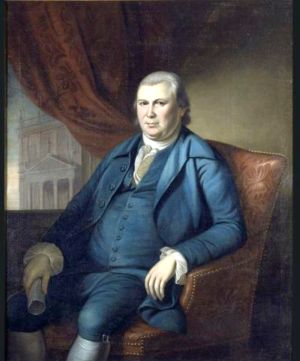
|
| Robert Morris |
UNDER the Articles of Confederation, America had a President who presided, but there was no executive branch for him to do anything administrative. The day to day business of the nation was conducted by committees of Congress, who mainly contracted out the actual work. Evidently, Robert Morris, the businessman had observed this system with displeasure, because it only took him a few days to replace it with departmental employees, reporting to him. The affairs of the nation were evidently in such disarray that there is scarcely any recorded resistance to this astonishing re-arrangement, probably viewed as only one of a series of brisk actions by this foremost businessman of the nation, acting in an emergency and to some extent using his own money. Furthermore, the immediate administrative improvement was apparently so obvious to everyone that the system continued after Morris left office, and was absorbed into the 1787 Constitution without much-recorded debate. Without dissent, as we say, the bureaucracy had been created. As the press of business steadily increased the bureaucracy, from a handful of employees to many millions of them, the fourth branch of government was created without any Constitutional mission statement, not one single word. Following directions set by early America's preeminent no-nonsense businessman, control of the bureaucracy was placed within the Executive branch, in time largely located within the District of Columbia, and governed by rules made by the Civil Service Commission. Sometimes this fourth and largest branch of government skirts dangerously close to encouraging insubordination to their politically appointed superiors.
For some reason, the State Department is particularly suspected of such "Yes, Minister" behavior. Increasingly, government subcontractors are relied upon ("privatization"), as the growth of public sector workforces a return to the subcontractor approach of two centuries earlier; such subcontractors increasingly find the bureaucracy assumes the role of the second Board of Directors. And for the same reason as before: the work of the central government keeps increasing. At a state and local level, an uncomfortable amount of political funding can be traced to utilities and other corporations who have been awarded legal monopolies, uncomfortably like the mercantilism which our colonist ancestors had found so repugnant to deal with. In the 21st Century, we are finally approaching the point where we can foresee the number of people working for some level of government becoming greater than the number of voting citizens, and therefore able to control their income and the nature of their work. When the bureaucracy begins to exert political election power over its elected superiors, elected politicians are almost certain to rebel at what they will surely see as going a step too far. However, on the topic of salary and work environment, they are likely to become allies. Public discontent is already echoed in the growing political movement to limit or shrink the size of government; it would be well to examine and pilot test alternative options before this one gets us into trouble.
In retrospect, this was one of many features of creating the three branches of government where broader implications went unnoticed in 1787. The British government had three branches, King, Parliament, and Judiciary. To create a government consisting of a President, a Congress, and a Judiciary did not then seem like much of a departure. However, the Revolution deposed the King and made the people sovereign. When the real implications of that breezy slogan had to be translated into legislative language serious implications emerged, unexpected then, and now hard to change.
zzz Note: Robert Morris Think Big
.
Two Friends Create the Articles of Confederation
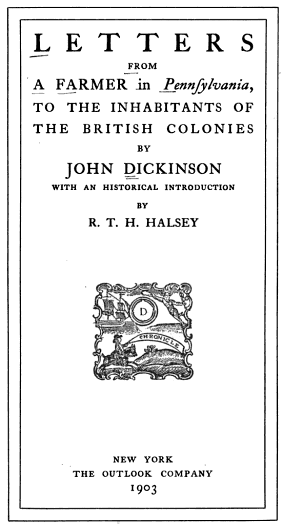
|
JOHN Dickinson had been highly critical of England's treatment of its colonies. As early as 1768 he had written a book called Letters of a Pennsylvania Farmer which is credited with strongly influencing the colonies in the direction of resistance to the British Ministry. When it came time to write the Articles of Confederation, Dickinson was the lawyer selected for the task. His good friend Robert Morris had been less outspoken in opposition to the Ministry's behavior, quite possibly because he was adept at finding workarounds for his own personal business problems. But possibly he was merely maintaining an ambiguous negotiating posture, since in a hotly contested election with this as the main issue, Morris was elected by both sides in the argument. When July 4, 1776, forced the issue both Dickinson and Morris had refused to sign the Declaration, but within a few months both of them were actively fighting for the Rebellion. The truest test of their evolving attitudes might have emerged when Lord North sent the Earl of Carlisle as an emissary after Burgoyne's defeat at Saratoga, offering peace with a sort of commonwealth status for the colonies. Not much is written about this curious episode, leaving it unclear whether the British were serious, and even if they were, whether the Americans understood the offer as serious. On the surface, the British offer conceded taxation with representation as the rebellion had been demanding. But it was rejected by Gouverneur Morris acting for -- who remains unclear. It seems possible the British were exploring the true feelings of people like Dickinson and Robert Morris but were disappointed. The earlier treatment of Ireland after it had agreed to a similar half-hearted autonomy did leave British sincerity in legitimate doubt.
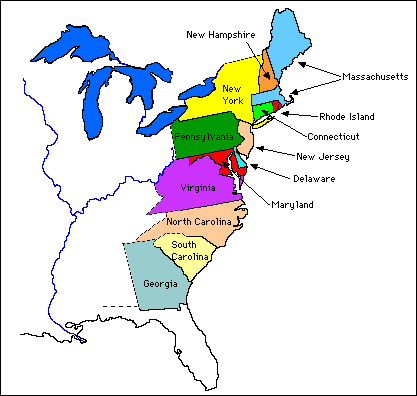
|
| Thirteen |
The thirteen colonies had united to fight the British King, but many of them were reluctant to unite for any other time or purpose. Rhode Island was perhaps the extreme example of this view of what Independence was supposed to mean, but the feeling existed to some degree in many colonies. Concern for the power of this feeling of tentativeness may have contributed an important reason the Articles placed heavy emphasis on declaring the document to represent a perpetual arrangement. Recognition of the weakness of this intent may have been an important reason why George Washington was later willing to sweep the issue aside, even though he of all people was most concerned to avoid the appearance of acting as an arbitrary king. For these and other reasons mainly revolving around state boundary disputes, the Articles remained unratified for years. Finally, in 1781 Robert Morris became convinced that failure to ratify was encouraging the states not to cooperate, and successfully pushed ratification through its steps. At that time, Morris was effectively running the country, even providing his own credit and funds to do it. People were reluctant to oppose his wishes, but they were also unwilling to provide the taxes, supplies, and troops that Morris imagined were being blocked by failure to ratify. Ratification of the Articles accomplished very little except to convince Morris: the Articles were flawed and must be replaced with something conferring more central power.
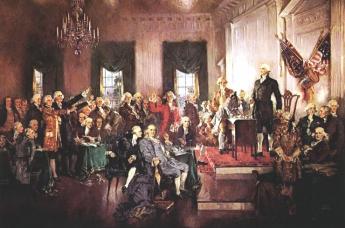
|
| The Goal: 1787 |
Little is known about the evolution of Constitutional thought in Morris' mind between 1781 and the Constitutional Convention in 1787, although a great deal is known about his other numerous activities. It is clear, however, that his experience with the recalcitrant Pennsylvania Legislature had been dismal, while he came to see the one insurmountable flaw in the current Federal government was its inability to levy taxes and consequently, to service national debt. The states were able to levy taxes under the Articles but erratic in doing so, resorting to paper money inflation at the first sign of tax resistance. In Morris' view, the key to the effective government was to reverse the situation; let the national government tax, let the states spend. The key to such rearrangement would be to permit the national government to spend on a very limited list of vital purposes, but bedazzle the states with a substantially unlimited shopping list if they thought they could afford it. As the accounts to pay for the Revolutionary War totaled up, it was apparent that the National Government had twice as much debt as the states. Therefore it would at most, need twice the state taxing power to service such a debt; presumably, wars would be infrequent and it would be less than that. Pay this one off, and potentially the need for future federal spending would be small. Indeed, under the presidency of James Monroe, the national debt was completely paid off, although briefly. It was almost as if Robert Morris and his pupil Alexander Hamilton had a crystal ball.
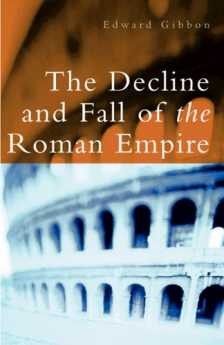
|
| Decline and Fall, Anyone? |
Robert Morris was brilliant and had six years to fashion his strategy, but he also had some help. For one thing, George Washington lived next door much of that time. By then, almost no one dared confront Washington. Adam Smith had written his book The Wealth of Nations in 1776, and Morris gave this extraordinary work as presents to his friends. Morris had corresponded with Necker, the genius financier of France, and through his good friend Benjamin Franklin, gathered insights from the rather advanced British national finance. And James Madison brought in scholarship about politics and statecraft accumulated by Witherspoon, Hume and the Scottish enlightenment. The year 1776 was a remarkable moment for new ideas. In that year, Edward Gibbon also published the first volume of The History of the Decline and Fall of the Roman Empire. The warning behind that important book had an important impact on the minds of important thinkers of the era, too.
Once you grasped all the central ideas, in this environment the resulting strategy almost worked itself out.
Those Troublesome Lees of Virginia

|
| Richard Henry Lee |
SOMETHING useful can, of course, be learned from a man's friends, but descriptions given by his enemies are usually briefer. The Lee family of Westmoreland County Virginia were bitter enemies of Robert Morris the Financier of the Revolution, and they surely said some unfair things about him. Morris paid as little attention to the Lees as possible, but for generations, the Lees had been neighbors of the Washingtons, and so could not be completely brushed aside. Furthermore, they were close to the center of Thomas Jefferson's anti-Federalist party. So insights into the Lee family probably illuminate the main disputes before, during, and after the Revolution. They even illuminate the mixed character of George Washington, who was sometimes unusual by Virginia standards. Nevertheless, the Lees had the same quality of heedless idealism to be found in Samuel Adams of Massachusetts and Patrick Henry of Virginia which goes beyond the ability of two-feet-on-the-ground revolutionaries like Robert Morris and Benjamin Franklin to understand, or even abide; this conflict runs throughout the history of the American founding. It seemed to baffle even those who switched positions, like James Madison going in a leftish direction, and Thomas Paine, going toward the right. So, although reckless idealism cannot be an inborn character, it must quickly acquire very deep roots.
.jpg)
|
| Arthur Lee |
Arthur Lee and his brothers William and Richard Henry Lee of Virginia, were passionate rebels of the Patrick Henry ("Give me liberty or give me death") sort, intermittently reviving lifelong attacks on Robert Morris. Highborn Tidewater aristocrats, they were ancestors of Virginia's revered General Robert E. Lee. Arthur had even attended Eton College and later studied medicine in England. The Lee brothers started attacking Robert Morris well before his famous abstention from the critical 1776 vote on independence. It's much too easy to shrug the Lees off as landed aristocrats who disdained self-made men, or as passionate Jacobins who hated self-made rich people, or maybe just narrow-minded nuts. Out of their often inaccurate attacks emerges an outline of what a lot of other people thought about Robert Morris. Many of these polar mind-sets outline the main divisions of political strife in America right up to the present. For present purposes, let's try to understand why Morris might risk his substantial fortune in underground smuggling before the war, and then dedicate his huge energies to winning the war -- while at the same time, not only refuse to agree to the Declaration of Independence (he did finally sign it in August 1776), but speak out in public opposition to independence. What explains Morris' apparent double-talk?
<The explanation I choose to accept is that Robert Morris' real feelings were too sophisticated for this particular crisis, reaching clearer expression in his later activities promoting the Articles of Confederation and its revision the United States Constitution. A man given to terse one-liners, Morris said in December 1775 that he joined his fellow Americans in striving for "Constitutional Liberty" but could not join them in promoting independence.
Morris was never explicit about what would achieve Liberty without Independence; perhaps something like the independent Irish parliament which English Whigs then supported, or the Scottish local parliament which exists today, was in his mind. Both of them link a single King to a commonwealth. At the time, no one was interested in the political philosophy of a shipping merchant.
But today we are in a position to see no member nation of the British Commonwealth has a written constitution; written constitutions are a comparatively recent innovation and not necessarily an essential one. The American Constitution today continues to argue about original intent and living documents, so it is still possible to prefer the wisdom of a benign King to written constitutions. The British goal seems to be to infuse overarching principles of government so deeply into citizen minds that such principles overwhelm any written commandments, however vague all that may sound to outsiders who prefer to niggle over documents. Not in America, of course, because an immigrant nation like ours cannot grow cultural roots sufficiently deep in a few generations, and must have written rules. Great Britain's recent difficulties with immigrants from the Commonwealth may well reassert the limits of unwritten constitutions; constant questioning of the written American constitution by more recent immigrant groups may become a part of the British life, too.
The Articles of Confederation were written by the eminent lawyer John Dickinson, said to be the man closest to sharing Robert Morris' political philosophy. However, for five years the Articles were unratified, and Morris began to believe this lack of ratification was the reason the states were so resistant to taxation. So Dickinson gets credit for writing the Articles, but Morris must be seen as their father. Believing the lack of federal taxation was the main difficulty, and blaming the unratified Articles as the reason for it, our businessman man-of-action pushed them through. Unfortunately, with the Articles it didn't work because the taxation problem still remained, so Morris turned his immense energies toward replacing the Articles with something which would work. It does not twist American history a great deal to believe that Robert Morris, Jr. was one of the main driving forces behind both the Articles of Confederation and the Constitution of the United States. He was neither a lawyer nor a political scientist and therefore was quite indifferent to who got credit for the documents. As Ronald Reagan was to discover two centuries later, that's one of the best ways to get anything done.
Morris could read; he knew the Articles didn't endorse Federal taxation. But he was apparently convinced an unwritten constitution always contains the latitude to do what simply has to be done; anything else amounts to shooting yourself in the foot. After the Battle of Trenton, when Morris became President of the United States for three months in everything except name, he still blamed his troubles on the inability to levy taxes, which in turn was due to failure of the states to ratify those Articles. So sensible a man as John Dickinson would never assume overly strict interpretation was intended; obviously, a state must confiscate private property when otherwise it cannot survive. After five years of state inaction, Morris abruptly pushed the Articles through to ratification. But he was wrong, it didn't help. When he finally grasped that the explicit limitations on taxation were intentional, intended to override any implicit power in the Articles whatever, he promptly threw his weight behind John Jay, George Washington, and James Madison to support a new Constitutional Convention setting it right, especially the national government's ability to levy taxes. Since Washington had by then become his best friend, who actually lived next door in Morris' Market Street house for years, there is not much paper trail of this interaction between these old friends. Once he got his tax mandate at the Convention, however, Morris had hardly anything further to say. His frenetic later activity immediately after the Constitution was enacted can almost surely be attributed to lifelong habits of a negotiator, avoiding mention of anything which might distract from his main goal, in this case of ratifying the Congressional right to levy federal taxes, but not abandoning subordinate goals for a moment. What the Lees hated about Morris, therefore, cannot be easily explained, but certainly, one feature of it was his ability to hold his cards face-down. The Lees didn't hold their cards, they flourished them. In their eyes, no gentleman would do anything else.
The incidents of June 1776 place the Lees in a more favorable light if they are seen as urging instinctive decisions by popular mandate, essentially favoring an unwritten British Constitutional arrangement. The Lees believed the place of a gentleman was at the head of a troop, daring the rest to follow their lead. The British had blockaded Boston, passed the Prohibitory Acts, fought naval battles in the Delaware River in May of that year. A huge British fleet had landed in New York harbor, and the agitated colonists were about to declare war. At the very moment of crisis, that rich Philadelphia merchant had refused to vote for independence. The Virginia tobacco planters were dancing a war dance in a city known for its pacifist Quakers, while their neighbor George Washington was conducting an actual war with the British. It was then revealed that Robert Morris had been participating in a gunpowder smuggling operation known as the Secret Committee, and Morris had made considerable profits from it. While many of his friends defended Morris, it was pretty easy to go wild with indignation about trusting him to sit on a secret espionage committee, unwatched. The very least that could be done was to appoint Arthur Lee, already a member of the Continental Congress, to that Secret Committee to sound the alarm if anything looked funny. The ironic fact seems to be that Morris and the Lees were passionately committed to the same unwritten approach to government, primarily based on trust in personal character, otherwise defined as fidelity to an unwritten tribal code. If you are the right sort of person, you will be with us; if you are not with us, you must not be the right sort of person. Unfortunately, a nation of immigrants may not survive if it adopts too many such notions.
The Lees had expressed disruptive views of Morris in the past, but they were exactly the sort of clan likely to confront scoundrels whenever facts called for it, and sometimes even when they didn't. The underlying conflicts, fiercely advocating both a strong centralized government and a loose decentralized one but not defining either, continue to run through American politics until the present. Whether Morris ever acknowledged it or not, he ended up on the side of defined contracts, as opposed to a Code of Honor. But he spent his life as a man of his word because in business your word is your bond; if you are any good, you won't need to cheat. If our Tower of Compromises is to endure, its limits of such agreement must be few, but they must somehow be strictly understood.
Why Jefferson Hated Banks and Hamilton Loved Them
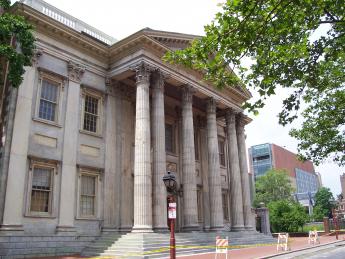
|
| First Bank of Philadelphia |
Some things are easier to understand when they start before they get complicated. That's true of banking, where it can now be puzzling to hear there was a strong inclination to forbid banks by law. While we were still a colony, the British discouraged bank formation, fearing strong concentrations of wealth at a great distance could lead to ideas of independence. Anti-bank sentiment was thus a Tory characteristic, although as the Industrial Revolution progressed, Karl Marx and Fredrick Engels stamped it permanently with a proletarian flavor. Large owners of farmland were displeased to see their power weakened by urban concentrations of wealth, while poor recent settlers of America wanted to buy and sell land cheaply, so they favored a currency that steadily declined in value. People with wealth have an incentive to keep money stable, but people with debts have an incentive to pay them off with cheap money. After these battle lines clarified and hardened, the debate has transformed from an original dispute about banks, into catfights about a strong currency. As Rogoff and Reinhart have pointed out, inflation is a way for governments to cheat their citizens, devaluation is a way of cheating foreigners. Naturally, politicians prefer to cheat foreigners, but national tradition curiously seems to favor one style more than another. Essentially, they are the same thing with the same motive, although outcomes may be different. One is restrained by fear of revolution, the other by fear of an international currency war.
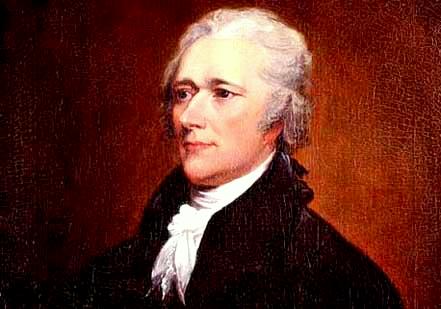
|
| Alexander Hamilton |
While George Washington was America's first president, Alexander Hamilton was Secretary of the Treasury and Thomas Jefferson was Vice President; the cabinet contained only four members. Although Hamilton was born poor, the bastard brat of a Scottish peddler in the view of John Adams, he had learned about practical finance in a counting-house, and later gained Washington's confidence on the headquarters staff; Washington eventually made him a general. Jefferson was part of the slaveholding Virginia planter elite, elegant in writing style and knowledge of art and architecture, sympathetic to the French Revolution; eventually, he died bankrupt. Early in the Washington presidency, Hamilton produced three long and sophisticated white papers, advocating banks and manufacture. Jefferson was opposed to both, one facilitating the other, which we would today describe as taking a green, or leftish position. Banks were described as instruments for accepting deposits in hard currency, or specie, and lending it out as paper money. The effect of this was a degrading of gold into paper money, or if not, an inflationary doubling of currency. Banks would be able to create money at will, a capriciousness Jefferson felt should be confined to the sovereign government. Just keep this up, and one day some former banker from Goldman Sachs would be able to tell the President of the United States, "The bond market won't let you do that." In this sense, the bank argument became a dispute about public and private power.
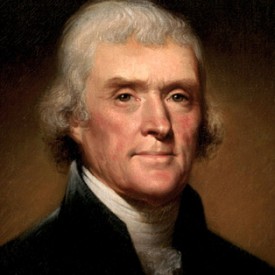
|
| Thomas Jefferson |
Hamilton, a former clerk of a maritime counting house, could observe that sending paper money on a leaky wooden boat kept the real gold in the counting-house even after the boat was lost at sea. To him, prudent banking transactions enhanced the safety of wealth, reducing risk rather than enlarging it. Later on, he learned from Robert Morris that a bank floating currency values on the private market disciplined the seemingly inevitable tendency of governments to water the currency. Once more, banks should enhance overall safety in spite of being vilified for creating risk. To both Hamilton and Jefferson, all arguments in an opposing direction seemed specious, designed to conceal ulterior motives.
Banks came and went for a century. By the time they almost were a feature of every street corner, banks were taking paper money (instead of gold and silver) as deposits and issuing loans as paper money, too; the gold was kept somewhere else, ultimately in Fort Knox, Kentucky. With experience, deposits could stay with the bank long enough that only a rare run on the bank would require more than 20% of the loans to be supported by physical ownership of gold. By establishing pooling and insurance of various sorts, banks persuaded authorities it was safe enough for them to hold no more than 20% of their loan portfolio in reserves. By this magic, loans at 6% to the customer could now return 30% to the bank. A few loans will default, a reserve for defaults was prudent, so the bank with a 2% default rate could settle for a 20% return rate. A bank which was deemed "too big to permit it to default" was invisibly and costlessly able to trim its reserves, and thus receive a 25% return by relying on the government to bail it out of an occasional bank crisis. With this sort of simple arithmetic, it is easy to see why multi-billion dollar banks were soon arguing that 5:1 leveraging was too small, a reserve of gold and silver was unnecessary, and the efficiencies of large banks were needed to compete with big foreign banks. By the time of the 2007 crash, many banks were leveraged fifty-to-one, which even the man on the street could see was over-reaching. The ideal ratio was uncertain, but 50:1 was certain to collapse, probably starting with the weakest link in the chain.
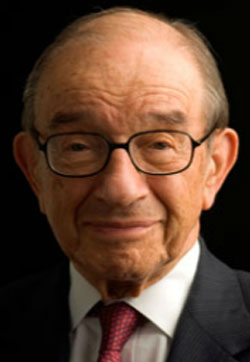
|
| Alan Greenspan |
This brings banking arguments more or less up to date. Except in 1913, an "independent" Federal Reserve Bank was created. It was a private reserve pool balanced by a public partner, the government. In time, the need for gold and silver was eliminated entirely, by the wartime Breton Woods Agreement, and the Nixon termination of it. The predictable inflation which could be expected to result from a world currency without physical backing was prevented by allowing the Federal Reserve to issue, or fail to issue as necessary, the currency in circulation. This substitution was deemed possible by having the Fed monitor inflation, and adjust the flow of currency to maintain a 2% inflation rate. Although 100% paper money was an historic change, it has endured; it has withstood efforts by the politicians to re-define inflation, undermine the indices of its measurement, and brow-beat the vestal virgins appointed to defend the value of the dollar. The old definition of money has changed: it is no longer a store of value, it is only a medium of exchange. The store of value is a nation's total assets. Jubilant politicians have added an additional burden of preventing unemployment, to the original one of defending price stability. In practical terms, the goal is defined as maintaining a 2% inflation rate, while achieving a 6.5% unemployment rate. It remains to be seen whether the two goals can exist at the same time, particularly if the definitions of inflation and unemployment become unrecognizably undermined.
And it even remains to be seen whether the black-box system can be undermined from within. The Federal Reserve is so poorly understood by the public that his enemies now accuse Alan Greenspan of causing the present recession. It is argued that the eighteen years of banking quiet which his chairmanship enjoyed, was only gradual inflation, deeply concealed. It is contended that the unprecedented steady rise of the stock market during those eighteen years was financed by a small but steady loosening of credit by the Federal Reserve. Perhaps what this means is: the definition of inflation must be tightened so its target can be made and adjusted, not to 2%, but to some number slightly less than that, measured to three decimal places. Or that the 6.5% unemployment target must be jettisoned in order to preserve the dollar. With that prospect including international currency wars as its corollary, it will be an interesting debate, and immigration policy is related to it. Because one alternative could become the abandonment of the fight against inflation, in order to sustain the new objective of reducing unemployment, Jefferson would have won the argument.
REFERENCES
| The History of the United States: Course 8500, 15 Hamilton's Republic: ISBN: 156585763-1 | The Great Courses |
| This Time Is Different: Eight Centuries of Financial Folly: Kenneth Rogoff, Carmen M. Reinhart: ISBN-13: 978-0691152646 | Amazon |
Bretton Woods
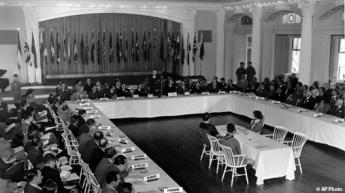
|
| The Bretton Woods conference in 1944 |
Stripped of its mystery and irrelevant details, the Bretton Woods conference agreed that all nations would make their currency convertible into U.S. dollars, and the U.S. would make its currency convertible into gold. Since World War II had left the United States with the only major working economy, it sold goods to the rest of the world and the rest of the world sent us their money to be converted into dollars; we had a "favorable balance of trade." Somewhere in the 1960s the rest of the world got on its feet, and we began to have an unfavorable balance of trade. After a while, foreigners started converting their dollars (the "reserve" currency) into gold. By 1971, the depletion of gold from Fort Knox became alarming, and the United States stopped converting its currency into gold. From that point onward, all currencies became effectively computer notations, whose value as a medium of exchange was what their government said it was.
Paradoxically, it is hard to see how this system would work without a government in charge of it, although private substitutes would probably soon appear if governments relaxed their monopoly on currency. Since a great many people dislike their governments for one reason or another, they chafe at a system which forces them to keep their governments in order to prevent commercial chaos. For those who do not adequately understand this, governments all stand ready to maintain themselves with force, and many other people dislike that feature even more. Since it took place at the same time, the Vietnam protest movement may have had some relation to this major change in the nation, misunderstood perhaps, but viscerally perceived. In view of President Nixon's central role in all of this, one is even tempted to speculate that his electoral promise of a secret means to end the Vietnam conflict, coupled with the subsequent peaceful surge of China and the financial recycling of Chinese money through Treasury bond purchases, may all have been subjects discussed during his historic trip to China.
However that may be, it is a fact that the Vietnam War ended, the Chinese economy flourished with American help, and the deposit of Chinese money in our economy helped fuel a massive economic bubble, and the weakest links in the chain -- mortgage-backed securities -- were the place the bubble burst. Not much of this could have occurred with a gold standard, and in many circles, this was regarded as proof that gold was a barbarous relic. In retrospect, few would deny we had been leveraging our economy to dangerous heights, for nearly fifty years. In 1996, Alan Greenspan denounced our "irrational exuberance", and yet the bubble did not burst for another twelve years. If we succeed in deleveraging our economy until it reaches 1996 levels, it will be regarded as a remarkable success. But the Chairman of the Federal Reserve at that time described it as a dangerous level. And looking back over the centuries, an indescribable number of kings were dethroned or beheaded because they evaded the rather irrational restraints of a scarce, hence precious, barbarous relic. Balanced against that, a billion Asiatics have been raised out of poverty, and the economy of the world overall would seem opulent to our grandfathers. Somehow, we must find the wit and the self-restraint to solve this problem.
REFERENCES
| The Battle of Bretton Woods: John Maynard Keynes, Harry Dexter White, and the Making of a New World Order:z Benn Steil: ISBN-13: 978-0691149097 | Amazon |
Cyprus Tests the Limits of Paper Money

|
| Cyprus Map |
Tourists like to banter about their favorite place in the whole world; until recently, mine was Cyprus. It's an eastern Mediterranean island, where it was possible to swim from beaches in the morning, ski in the afternoon, and luxuriate in an inexpensive but posh hotel in the evening. The locals had their ethnic rivalries, but what would tourist care. Since I was last there, apparently Russian and other billionaires discovered the place, and now three local banks are bigger than the GNP of the nation. Like Ireland, Hungary, Iceland, and several other small European nations, this dystrophic growth made it impossible for the government to guarantee the assets of the banks, as the familiar "lender of last resort" because the banks were bigger than the government. Accordingly, the local government was forced to declare a protracted bank holiday, to forestall what was certainly going to turn into a run on the banks as depositors all tried to get out the door at the same time. International stock markets immediately dropped a noticeable number of points, as the whole world suddenly discovered Cyprus wasn't such a nice place to put your money after all. The Russians might possibly be nasty people, but in this matter of bank deposits, people all link arms internationally like brothers.
There have been lots of other bank panics in small nations without much agitation, so what seems to have bothered the markets was the decision of the Central European Bank to tax the depositors 10% to support the system. Christine Lagarde, the head of the International Monetary Fund, said she thought it was a good idea to tax depositors, and that really upset a lot more people. Ms. Lagarde is French, but the IMF which she heads is located a few blocks from the U.S. White House, so the suspicion grew that Mr. Obama might approve of placing a tax on bank deposits, too. As things started to get out of hand, everyone hastily dropped the whole idea, and even the Cypriote Parliament voted against it. There was no time for even the large organizations devoted to managing the news to manage this one. World opinion was instantaneously mobilized, and thunderous in voicing its low opinion of taxing bank deposits, by anyone, anywhere. What was accidentally aroused was the realization that since the World went off the gold standard in 1971, the world's money is backed by nothing at all except a computer notation? Irrevocably taxing it in bank accounts could be done in an hour.
In 1944 the international conference held at Bretton Woods, New Hampshire, agreed that other nations could exchange their currency for American dollars, but only the U.S. dollar could be converted into gold. As long as the U.S. ran a trade surplus, the gold remained undisturbed in Fort Knox. But when other nations began to export their goods in the 1960s, their dollars began to be changed into gold. Gresham's Law took over quickly since when two currencies of unequal value circulate together, the more valuable one will quickly disappear; the shifting balance of trade had made gold more valuable than dollar bills. When President Nixon began to see that Fort Knox was soon going to be emptied, he put a stop to the exchange. He "closed the gold window". At that point, we were all off the gold standard, but nothing much happened. It remained possible to continue to speak of gold as a "barbarous relic", and by implication, any standard like silver or oil or land was also a barbarous relic. But the experience of Cyprus taught the world that everyone did want the value of a currency to be independent of the whims of government, and like the Emperor's suit of clothes, was just waiting for someone to point it out. A system of monetary exchanges, or exchanges of goods and services, really can be run without backing by anything except the word of government. But inflation targeting does need a government to run it, and thus governments have acquired a power over currencies which centuries of experience had taught people not to trust for a moment. North and South American hemispheric trade had been comfortably run without governments for centuries, as long as there were Spanish pieces of eight in actual circulation. But the modern Cyprus government could not run for a week without the trust of depositors, and neither can any other government. Conversely, it is impossible to run an economy without a government to guarantee the international value of money. People don't like that situation, and the threat of chaos in the streets is not much different in any place in the world which does not run a brutal military system. When you reach a point where even the soldiers refuse to be paid with paper money, you are about at the point General George Washington found himself after the Revolution. Robert Morris convinced him it would be possible to base a currency on the credit of the nation, and General Alexander Hamilton had been taught how to run such a thing. The rest of the country didn't understand what that meant, but they did understand that it seemed to work. But it would only work if the people trusted their Constitution, and the government is designed. But then, our government never tried to put a tax on bank deposits. In fact, it took another hundred years before the American public was completely certain you could trust banks even to exist. The good ol' mattress, that's where to keep your money. If it's in gold coins, that is. Paper money might just as well be in a bank because its value is only symbolic of a government promise.
REFERENCES
| The Battle of Bretton Woods: John Maynard Keynes, Harry Dexter White, and the Making of a New World Order: Benn Steil: ISBN-13: 978-0691149097 | Amazon |
| Robert Morris: Financier of the American Revolution: Charles Rappleye: ISBN-10: 1416570926 | Amazon |
| Bitter Lemons: Lawrence Durrell: ISBN-13: 978-1604190045 | Amazon |
Gold Standard Substitutes
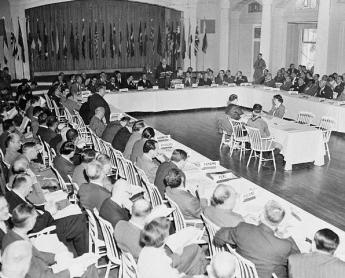
|
| Bretton Woods conference in 1944 |
Make-shift proposals to address international monetary crises after 2007, particularly confiscation of bank deposits suggested briefly in 2013 for the Mediterranean island of Cyprus, stimulated a search for a better monetary system. A gold standard sufficed for thousands of years, but the Industrial Revolution increased world economies faster than gold metal was discovered, constantly driving prices downward. It became increasingly difficult to manage the rapid growth of debt, as happens in wartime. The crisis which led to the 1944 Bretton Woods Conference was the inability to accommodate the massive national debt rearrangements of the Second World War. With the United States owning two-thirds of the world gold supply, international trade was seriously impaired.
Bretton Woods created the International Monetary Fund and the World Bank, which can be ignored for present purposes. It established the United States dollar as a "reserve currency", alone able to be exchanged for gold. Other nations were allowed to exchange their money for United States dollars. Supplemented at the Bretton Woods conference in 1944 by this gold-standard-once-removed (the U.S. dollar as a "reserve currency"), this expedient only prospered as long as the United States could maintain a positive trade balance. After 1960, the outflow of gold from Fort Knox was relentless, and in 1971 the United States was forced to abandon its buffering between gold and the world's banking systems. After 1971 the world's currencies would supposedly trust their central banks to be "lenders of last resort", but in the financial crises after 2007 many could not sustain that obligation. What they could do was devalue their currency, and even that expedient was blocked by the rules of the eurozone. Put to the test, the European Central Bank became uncertain it wanted the role of lender of last resort. At one time, the gold standard had provided the one backing for a currency which was independent of all governments' temptation to inflate away their debts. The U.S. reserve-currency buffer extended the system for several more decades, but after President Nixon cut the link to gold, the post-1971 system only provided a promise of a government rescue, without the universal ability of governments to live up to the promise. In a sense, governments backed their currency with a mortgage on the nation, and many mortgages were already overextended. For those nations, variants of the gold standard had been replaced by no standard at all. Since governments which had historically been the cause of inflation were now expected to be the source of its restraint, the private sector urgently needed to devise a new system to force the public sector to accept a new and unwelcome role.
Money on a gold standard was formerly both a storehouse of value and a means of exchange. The world supply of gold was unable to keep pace with the world's increasing wealth for more than a century, so prices were driven down, disrupting long term debts. Rising prices were just as bad; what commerce needed was price stability. What was devised for the 1971 disruption was inflation targeting. The Federal Reserve and to some extent the other major central banks, issued or withdrew currency to achieve a 2% inflation rate, thus hoping to maintain stable prices with a 2% growth rate. Skipping over the details of central banking, the Federal Reserve could safely count on the government to promote inflation at almost all times; the need was to restrain it to 2%. Unfortunately, contraction at 2% takes about as long as expansion at 2%, frustrating the hope of the public to have booms last as long as possible and depressions to be over as soon as possible. Periodic episodes of deflation are a problem. From time to time the economy expands its production capacity faster than consumption can grow, and the inevitable resulting panic not only impairs the ability of banks to lend but frightens the public away from borrowing. Without a gold standard, prices then fall even farther and faster than with gold support because money no longer has any intrinsic value. Our problem thus reduces itself to two requirements.
Without a gold or other monetary standard, and seeking to preserve the inflation-targeting system, how can we induce prices not to fall in a depression? And, how can we induce a booming economy not to increase its production capacity beyond what it can consume or sell, so that every boom period stops being followed by an uncontrollable crash? That is, much of the problem of keeping production from falling, is to prevent it from going so high it has to fall. That's not so easy in a democracy; if you stand in the way of making money when making money is easy, you will very likely be voted out of office. Price controls, by the way, have been tried many times; they always fail. The practical problem is thus pressed into the mode of forcing savings into some sort of escrow fund, during boom times. Meanwhile, the practical politician must persuade a suffering public that, once you overbuild capacity, it will probably only wear out at the same 2% rate that it took to grow so big. These are not new sentiments; the public must learn self-restraint during booms, something it has repeatedly resisted.
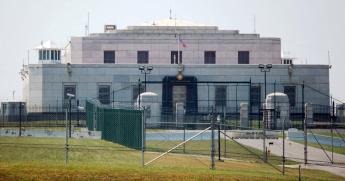
|
| Fort Knox, KY |
Features particularly irritating to the private sector about the Cyprus proposal had several sources, all of them heightened by annoyance that the bureaucracy would immediately try to force the private sector to pay for administrative design blunders. A gold standard permits international trade in defiance of government wishes; a currency without a physical store of value cannot exist without workable rules for international trade. If satisfactory rules cannot be made, voices will demand a return to the gold standard. No one said the Greeks and the Turks should love each other; no one said the Russians must respect private property. What is stated is if workable rules are not forthcoming, private alternatives will arise.
Ben Bernanke is not only the chairman of the U.S. Federal Reserve, but he is also one of the recognized academic experts on managing depression. He has spent his life studying this particular problem and occupies the most powerful position among the group charged with doing something about it. His innovation in the management of a financial crash is QE, quantitative easing. Essentially, this amounts to the creation of a fund managed by the Federal Reserve, generated by purchasing bonds with money created by the Fed. The content, size, and purpose of the fund have varied in the past few years, to the point where it amounts to a gigantic fund at his disposal, as needed, Initially, it injected funds into markets frozen with fear, and successfully unfroze them, making a profit for the Treasury along the way. He next used the fund to manage a gigantic Keynesian effort to stimulate the private economy with a federal fund. While it is possible this stimulus averted some worse disasters, the net effect was not outstanding and is generally regarded as a failure. His current effort, titled QE3, amounts to an enormous effort at what is termed "good bank, bad bank" in financial jargon. Because so many good bonds are undervalued in a recession, it is believed they will return to true market value if the truly bad bonds are removed from the market place. In Victorian days, this was accomplished by bankruptcy, but it is thought to be more humane to buy up and remove them temporarily from the marketplace. The humane approach, of course, has the disadvantage that the bad bonds may reappear later, and some critics say it is only a variant of "kicking the can down the road." It seems to have worked well for the Scandinavians however, and the final verdict cannot yet be issued. For the purposes of the present discussion, the essential point is that a three-trillion dollar discretionary fund has been put in the hands of the most powerful and most knowledgable person involved in international finance. At the moment, the fund contains most of the dubious bonds in circulation, but there are signs that Bernanke plans to replace them with U.S. Treasury bonds, thought to be the safest investment available. He can essentially do anything he pleases with this fund, subject only to the approval of the rest of the Board.
It must have occurred to Bernanke, that this multi-trillion dollar fund of the safest investments on earth would make a highly suitable substitute for gold, if it ever becomes clear that the world needs to return to some tangible commodity to back its currency, or become the new lender of last resort, if we choose to put it that way. Mr. Bernanke essentially needs no one's permission to create this fund, but to use it in some novel way would require the permission of politicians, acting in some way identifiable as the will of the American public. If it should come to that, a few suggested limitations immediately come to mind.
In the first place, one of the main purposes of imposing a gold standard on spendthrift Kings was to keep the King from spending it and substituting his own worthless paper money. Three variants of this threat, inflation, devaluation and confiscation, all amount to the same thing, which would get us back to our present predicament quite quickly, indeed. Mr. Bernanke must realize that our Constitution was written by Founding Fathers who were intensely fearful of entrusting as much power to one person as Mr. Bernanke would likely possess if this idea moved to implementation. To put it bluntly, the first action after it is done should be to surrender the ability to do it. To take another lesson from Constitutional history, it might be remembered that the functions of the Legislative Branch were established in six months, those of the Presidency evolved in the first five years of George Washington's office, and those of the Supreme Court required forty years to evolve. During all of that time, the ability to destroy the Constitution's main purposes had to be shielded from unbelievers, and an apparently unnecessary Bill of Rights had to be appended to reassure the remaining doubters. The main risk to this technical monetary reconfiguration is not monetary, but political.
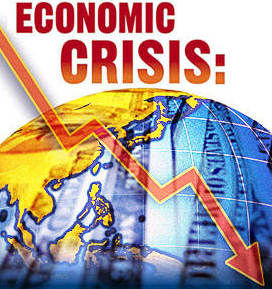
|
| Financial Crisis |
But there are technical issues, as well. Because they are technical, it is more difficult to depend on wise public opinion, and thus it enhances feasibility when technical issues can be translated into political speech. Because events have demonstrated it is much more difficult to reverse a depression than a bubble, thought should be given to devising ways to use this new vehicle to reverse depression. Obviously, it should be used to unfreeze a frozen market; that's an important lesson from the success of 2009. Furthermore, the revenue from three trillion dollars of bonds is appreciable and should be used to finance tax reductions in a recession. More importantly, it should be withheld from government treasuries to restrain a developing bubble, more or less forcing governments to raise taxes during a bubble. Perhaps standards are necessary for expansion and contraction of the fund itself to supplement the use of the fund's income in those extreme situations. Indeed, to forbid the use of principal for those end-purposes might leverage the effectiveness of changing the fund balance, because it would force larger swings of principal to be adjusted. Most of these considerations come into play when a bubble is being restrained because it is easier to restrain a growing bubble than to repair the damage once it bursts. Restraining a growing bubble is not easy, and picking the right time is still less easy. Better to make most of it automatic, and related to defined market benchmarks. Benchmarks may be inaccurately chosen, but at least something is learned for the next time.
Mr. Bernanke's QE fund is not the only one which could take the place of gold in a new monetary standard. Commodities of various sorts would not be much different from gold and might soften the volatility of the mining supply. Land could be used, or fresh water, or petroleum; perhaps we could divide up the ocean in some way. Among the more attractive candidates would be world index funds of stocks or bonds; bonds seem perhaps more suitable, perhaps not. But at the moment, no one seems to be exploring any substitute monetary standard other than gold or the QE fund. Perhaps the disadvantages of each would cancel out in a basket of all the suggested standards. Perhaps inflation targeting can be improved, and no other benchmark is needed; perhaps international branch banking could cover the requirements. And perhaps it is all an academic exercise, but it would still seem helpful if academia would explore a little further, just in case we need them.
Robert Morris, Financial Virtuoso
For reader convenience, we here divide Robert Morris' financial rescue of wartime America into two parts before and after 1780, because he had two episodes of being officially in charge. The first immediately followed the Battle of Fort Wilson when chaos and worthless paper money required a strong hand; it will be described next. The second episode followed the later near-revolt of the Continental Army but has already been outlined. Here, Morris was recalled to the office with chaos erupting at the end of the war came in sight and everyone was reluctant to fight battles for no military purpose. At the same time British, French and American politicians connived for victory in a war each had failed to win militarily. For simplicity, time sequences have been distorted a bit, concentrating the creation of modern banking into the second episode, where failure to coordinate banking with taxation ultimately led to the Constitutional Convention in 1787. Chronology has been sacrificed to enhance clarity. It is now time to return to the brilliant expedients Morris employed after he took charge following the Fort Wilson shocker, omitting some of the banking details already described.
What helped the first crisis most was the ready availability of a financial genius to turn around a crisis, when just about everyone else was at a total loss. Robert Morris had made his fortune, probably the richest man on the continent, and nursed the grievance of crowd abuse at the Battle of Fort Wilson. He had some novel concepts to test; it is not too much to say he showed them off, particularly since they displayed a man in charge with prodigious energy, applying a financial virtuosity of seemingly unlimited ideas. No one else came close to Morris in stature, and he must be forgiven for flaunting it a little.

|
| Robert Morris |
At the climactic moment, however, Morris played coy. He was not so sure he would accept the office of Financier, a term newly invented for the occasion. Accepting Ben Franklin's cynical assessment of the future, he wanted everyone to be clear: he was not going to give up his private partnerships. And he insisted on his right to hire and fire anyone at all within the government bureaucracy who was concerned with public money. He accepted responsibility for new debts of the government, but not for old debts incurred before he took office. He would furthermore delay taking the oath of office for a few months. These conditions naturally generated wild opposition in Congress; Morris was serene, and Congress finally had to agree. Most of these terms had some obvious purpose while making no secret of his distrust of Congressmen. In fact, the opposition might well have hardened its position if the purpose of delaying the oath had been fully expressed. Morris wanted to delay becoming a federal officer in order to delay resigning from the Pennsylvania Assembly. During the interval, he applied similar power tactics to the Legislature, ending up simultaneously in charge of both state finances and federal.

|
| Yorktown: Oct. 19, 1781 |
That purpose was soon to emerge, as just one instance of many tough tactics. Inflation tossed and turned the finances of everyone, so Morris would buy with one currency and sell with another, taking advantage of brief fluctuations, then quickly reverse the currency transaction when advantages shifted. He arranged with the French and Spanish ministers to keep their loans and foreign aid in separate accounts, applied the same techniques with state accounts, and even between near and distant counties within Pennsylvania. He thus had a choice between many currency values at any one moment. His far-flung commercial network supplied him with more precise information than his counterparties could get, and usually more quickly, so his trading activities were usually profitable. One rather extreme example was the arrangement with Benjamin Franklin in Paris; Morris would write checks to Franklin in one currency and Franklin would write identical deposits back to him on the same day but a different currency. He thus extended ancient practices among international merchants, carrying them over to government operations, which had the effect of creating a modern currency exchange. To outsiders, however, particularly his political enemies in Massachusetts and Virginia, it looked fishy. To modern observers, the astonishing thing was his ability to keep such complexity in his head. The political class which even today sees it as natural that governments might want to manipulate currency as they please might describe Morris strategies as dubious. Those who believe the market price is usually the true price however, must applaud this strategy for forcing manipulated prices back to market levels. Since here has rested the central dispute in American politics for two centuries, Morris must be credited with inventing even that dispute. One would normally suppose that doubling the silver price of American currency in two months would vindicate his trading strategy; but it has not always done so, suggesting the nature of the questioning has been more ideological than economic.
Within days of assuming office, the "legal tender" laws were repealed, stripping government of the ability to force its citizens to accept the worthless currency, impose rationing and price controls, and otherwise assume the mantel of "sovereignty". Like a miracle, food began to reappear in the Philadelphia marketplace at a lower price, and confidence in the competence of government began to return. To whatever degree the British ministry had been deliberately stalling the peace talks in the hope of American collapse, this incentive was dissipated.
The list of financial innovations which Morris produced in a remarkably short time, is seemingly endless. He next became central in the creation of the first American bank of the modern sort, the Bank of North America. And somewhere in that welter of activity appears to be the recognition of the so-called yield curve. Loans for a few weeks or months command a much lower interest rate than long-term loans; in the colonial period, almost all loans were for six months or less. Morris seems to have realized early that great profitability could be achieved by merging a sequence of several short loans into one long one. He thus devised a number of strategies which had the general effect of linking short loans together. Using the remittance for a transatlantic cargo in one direction as payment for the return cargo on the same ship was an early example. Once you grasped the idea and did it deliberately, long sequences of linked loans began to suggest themselves. Just to complete the thought, it might be noticed that present-day globalization reverses the process, with shorter-term loans for components substituting for longer-term loans for the entire assembled product. With lower interest rates, competitive prices can be reduced, unless a choice is made to increase profits.
There's one last issue in Robert Morris folklore: Did he finance the whole Revolution out of his own pocket? The answer is surely no because Beaumarchais ended up spending much more than any other individual, however involuntarily. The degree to which hard currency originated with the French, Spanish and American governments is a little unclear, and war damages are impossible to appraise. There were moments when Morris did personally finance major cash shortages, adding the considerable advantage of speeding up what could be a cumbersome process of budgeting, committee consideration, disputes, and hesitation. Where it was feasible, he sought restitution. Every bureaucrat has experienced delays and obstructions he dreams of eliminating by simply paying for it himself; Morris had the advantage that within reason, he could afford it.
As a very rich man, his more important personal contribution was his pledge to make good if the Treasury defaulted. Creditors generally preferred his credit to that of the government; his pledge was to pay if the government could not. His "Morris Notes" were not paying, but rather reinsuring government debts, in modern terms offering a Credit Default Swap. If we lost the war and our debts defaulted, Morris would have lost everything he had. But short of that, his pledge would result in much smaller losses. The public couldn't be expected to understand all that, so some simplified explanations were understandable. There were probably a number of similar examples, but near the end of the war, there was a particularly clear one. The Continental Army was very close to revolt when it looked as though Congress would disband the soldiers without paying them; there was no money but unpaid demobilization would likely send rioting soldiers through the countryside. Morris came forward with a million dollars of his own money and saved the day. Washington was forced to make emotional speeches appealing to the patriotism of the troops, but with most of the army barefoot, that was not certain to hold them back. Under those circumstances, to come forward later like Arthur Lee and remind everyone that Morris had once refused to sign the Declaration of Independence, was ingratitude of the meanest sort.
The accusation made after the war was that he profited from government losses, but there has never been evidence of that. His position was that he came out about even. Unspoken in these quarrels was the plain fact that until he got involved in the post-war real estate boom, he didn't need to cheat. Probably didn't even have time for it.
The Revolutionary War continued for two years after Morris took office for the second time, so war losses continued in spite of improved financial management. Both the French Government and the American one were at the edge of bankruptcy. Britain was also in political chaos, but it was only small consolation that Parliament had granted Independence to the Colonies when King George III remained adamant that it wasn't going to happen to his colonies. Strengthened by the British defeat of the French Caribbean fleet, the capitulation by the Spanish about Gibraltar, and great uncertainty about the Crimea and India -- almost anything was possible. Eventually, matters began deteriorating again. The British even then had the financial strength to hold out much longer, but obvious neglect of other opportunities eventually wore them down. Morris seemed to be winning, just by not losing.
In the midst of such anarchy, Morris had to admit his greatest failure as the Financier but was already formulating his plan for setting things on their feet. The Revolutionary War as seen by a financier had either been won by the British system of taxation or else lost by the American and French lack of such a system. It was irrelevant whether the War was described as a defeat for Britain or a victory for America; in Morris' view, the British had a good system and we had a poor one. No nation can finance a major war out of current receipts; you have to borrow. Your security for loans is the economy of your nation. Even if your illiquid assets are adequate for the war, the banking markets regard your ability to pay cash for the interest on the loan as their only reliable test of your solvency. That is, a nation at war must have the ability to keep the bankers happy with regular interest payments. For that, a nation had to have a proven system of reliable taxation. Britain had it, and the American/French alliance didn't. Franklin's masterful diplomacy was just lucky enough to achieve generous terms, but that wasn't good enough, we had to have a Federal tax system to survive and thrive. And to achieve that, we had to have a new Constitution. Never mind that resentment about British taxes got us into this mess. Never mind the chaos attending the Treaty of Paris. Never mind the war-weariness, bitterness, and destitution of the troops. Never mind that Morris was now about to embark on one of the most mind-boggling real estate ventures in history, was going to go to debtor's prison, was going to engage in millions and millions of dollars of borrowing and restitution. Never mind. We needed a new Constitution, and we were going to get it. Think big.
Penman of the Constitution
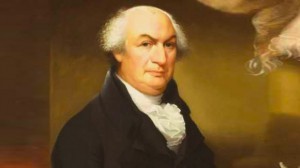
|
| Gouverneur Morris |
THE Constitution is the product of many minds, its ideas have many sources. But final phrasing of the unified document can largely be traced to a lawyer, Gouverneur Morris. The Constitutional Convention would announce a topic, argue for days about different resolutions of it, and then vote on or amend a composite resolution ( unless the matter was deferred to another day of earnest wrangling.) After months of deliberation, that jumble of resolutions made quite a pile. The Convention then turned it all over to Gouverneur Morris for smooth editing and uniformity. Although Morris had arrived a month late for the Convention, he still had time to rise and speak his views more than any other delegate, 173 times. But comparatively few of his ideas identifiably survived the voting; by Convention's end, the delegates were most likely listening for elegance and poise, increasingly expecting the final edit to be his. He finished the task in four days, and the full convention only changed a few words before accepting it. This assembly needed a lawyer who would sincerely follow the intent of his client, rather than yield to the slightest temptation to warp it with his own views. The convention had heard his opinion about almost everything, were thus alerted to uninvited slants. He gave them what they asked for, wording it for persuading the nation, as he himself had been persuaded by what the delegates wanted. The remarkable degree to which he had faithfully served his client's wishes, rather than his own, only emerged twenty years later. During the War of 1812, he disavowed the Constitution he had written.
 We the People of the United States, in Order to form a more perfect Union, establish Justice, insure domestic Tranquility, provide for the common defence, promote the general Welfare, and secure the Blessings of Liberty to ourselves and our Posterity, do ordain and establish this Constitution for the United States of America. 
|
| Preamble to the Constitution |
Morris mostly shortened what the delegates had said. A word here, a phrase there, sometimes whole sentences were removed. After that, rearrangement, and substitution of more precise verbs. This lion of the drawing room, this duelist of the salon, undoubtedly had an enjoyable time twitting his less accomplished clients with brisk capsules of what, of course, they had meant to say. To remember that he was outshining Benjamin Franklin and most of the other recognized wits of the continent, is to savor the fun of it all. Of all people in the Enlightenment, Franklin was certainly Gouverneur's equal in sparkling exchanges of debate. Here, he did not even try.

|
| John Peter Zenger |
Where did this apparition come from? He was almost but not quite a lord of the manor, referring to his extensive riverfront estate in the Bronx called Morrisania, which dated back seven generations in America and ultimately belonged to him, but the title went to his half-brother. He was unquestionably a member of that small society which settled America before the English colonization. Even George Washington was only a fourth-generation American. The Morris side of the family had included two Royal Governors of New York, including the one who tried to imprison Peter Zenger for telling the truth. Gouverneur was his mother's family name, one of the Huguenots who settled New Rochelle in 1663. Under the circumstances, it is not surprising that his mother was a loyalist, and his half-brother a Lieutenant General in the British Army. Gouverneur Morris was a brilliant student of law, unusually tall and handsome for the era. He was as tall as George Washington, and Houdon used him as a body model for a statue of the General. Among the ladies, he created a sensation wherever he went. At an early age, however, he spilled a kettle of hot water on his right arm, which killed the nerve and mummified the flesh. The pain must have been severe, with not even an aspirin to help, and the physical deformity put an end to a big man's dreams of military valor. To a young mind, the physical deformity probably seemed more disfiguring than it needed to be, in addition to diminishing his own ideas of himself. He turned to the law, where he was probably a fiercer litigant than he needed to be. And more of a rebel.
The timing of circumstances drove him out of Morrisania, then out of Manhattan, as the invading British cleared the way for the occupation of New York City. Then up the Hudson River to Kingston, and on to the scene of the Battle of Saratoga. He had been elected to the Continental Congress but stayed in the battlegrounds of New York during the early part of the Revolution, helping to run the rebel government there, and making acquaintance with George Washington, whom he soon began to worship as the ideal aristocrat in a war he could not actively join as a combatant himself. With Saratoga completely changing the military outlook for the rebellion, Morris was charged up, ready to assume his duties as a member of the Continental Congress. By that time, Congress had retreated to York, Pennsylvania, George Washington was in Valley Forge, and the hope was to regroup and drive the British from Philadelphia. For all intents and purposes Robert Morris the Philadelphia merchant, no relative of Gouverneur, was running the rebel government from his country home in Manheim, a suburb of Lancaster. After presenting himself to Robert, Gouverneur was given the assignment of visiting the camps at Valley Forge and reporting what to do about the deplorable condition of the Army and its encampment. By that time, both the British and the French had about decided that the war was going to be decided in Europe on European battlefields, so the armies and armadas in America were probably in the wrong place for decisive action. Lord North had reason to be disappointed in Burgoyne's performance at Saratoga, and Howe's abandonment of orders, even though by a close call he had captured the American Capital of Philadelphia. Consequently, Lord North added the appearance of still another defeat by withdrawing from Philadelphia, deciding in the process to dispatch the Earl of Carlisle to offer generous peace terms to the colonies. Carlisle showed up in Philadelphia and was more or less lost to sight among rich borderline loyalists of Society Hill like the Powels. His offer to allow the Americans to have their own parliament within a commonwealth nominally headed by the Monarch went nowhere. The Colonist Revolutionaries were being offered what they had asked for, in the form of taxation with representation. To have it more or less snubbed by the colonists was certainly a public relations defeat to be added to losing Philadelphia and Saratoga. In this confused and misleading set of circumstances, Gouverneur sent several official rejections of the diplomatic overture and wrote a series of contemptuous newspaper articles denouncing the idea. It seems inconceivable that Gouverneur would take this on without the approval of Washington, Robert Morris, or the Continental Congress, to all of whom he had ready access. But if anyone could do such a thing on his own responsibility, it was Morris. One hopes that future historians will apply serious effort to clarifying these otherwise unexplainable actions.
With of course the indispensable help of retrospect, some would say Gouverneur Morris had committed a massive blunder. The Revolutionary War went on for six more years, the Southern half of the colonies were devastated, and the post-war chaos came very near destroying the starving little rebellion. The alternative of accepting the peace offering might have allowed America and Canada to become the world powers they did become; but the French Revolution or at least the Napoleonic Wars might never have happened, the World Wars of the Twentieth century might have turned out entirely differently, and on and on. Historians consider hypothetical versions of history to be unseemly daydreams ("counterfactuals"), but it seems safe to suppose Gouverneur Morris changed history appreciably in 1778. Whether he did so as someone's agent, or on his own, possibly remains to be discovered in the trunks of letters of the time. Whether the deceptive atmosphere of impending Colonial victory was strong enough to justify such wrongheaded decisions, is the sort of thing which is forever debatable.
While most of the credit for the style of the Constitution must go to Gouverneur Morris, there is a record of a significant argument which Madison resisted and lost, about the document style. During the debates about the Bill of Rights, Roger Sherman of Connecticut rose to object to Madison's intention to revise the Constitution to reflect the sense of the amendments, deleting the language of the original, and inserting what purports to be the sense of the amended version. That is definitely the common practice today for organization by-laws and revisions of statutes; it is less certain whether it was common practice at the end of the 18th Century. In any event, Sherman was violently opposed to doing it that way with amendments to the Constitution. After putting up a fight, Madison eventually gave up the argument. So the 1789 document continues to exist in its original form, and the fineness of Morris' elegant language is permanently on display. It may even help the Supreme Court in its sometimes convoluted interpreting the original intent of the framers. In any event, we now substitute the unspoken process of amending the Constitution by Supreme Court decision, about a hundred times every year. By preserving the original language, the citizens have preserved their own ability to have an opinion about how it may have wandered.
REFERENCES
| Gentleman Revolutionary: Gouverneur Morris, the Rake Who Wrote the Constitution : Richard Brookhiser: ISBN-13: 978-0743256025 | Amazon |
Peggy Shippen and Benedict Arnold: Fallen Idols
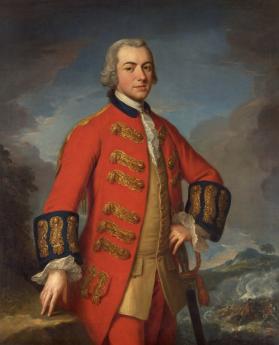
|
| General Burgoyne |
After defeating Washington's troops at the battle of Germantown, the British then occupied Philadelphia for the better part of a year. The town was a mess, with food shortages typical of the squalor of any occupying army equalling the existing population. Washington was forced to fall back to the natural fortress of Valley Forge. The city of Philadelphia was not exactly under siege, but it was as difficult a place for British troops to live as a besieged city. For his part, Washington was forced to shiver and starve in the nearby mountain valley, at least consoled by distant news of American achievements. General Burgoyne and his army were soon captured at Saratoga by General Gates under humiliating circumstances. Clearly, the dashing hero of this event had been Benedict Arnold on a white horse leading the charge, getting wounded in the leg in the process.
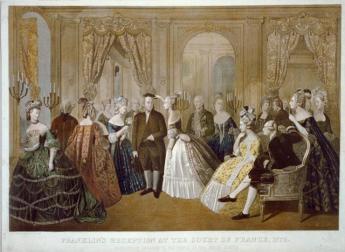
|
| Benjamin Franklin in Paris |
Benjamin Franklin in Paris trumpeted the news of this victory, reminding the French of Washington's earlier victory at Trenton, and maneuvering it all into a treaty of alliance. With the French fleet in the nearby Caribbean, Philadelphia was no longer a safe place for the British to stay a hundred miles upriver, and the idea of abandoning occupied Philadelphia began to grow. Having gambled on British victory in defiance of London's orders, the Howe brothers were not in a position to argue with new orders. The British soldiers inside the city were more comfortably housed than the American troops outside it, but nobody was exactly comfortable. The American Congress had, of course, fled to the hinterlands. All in all, it suddenly became uncertain who was going to win this war.
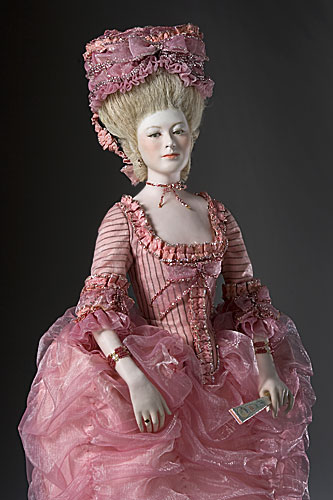
|
| Peggy Shippen |
The American population at this time has been described as a one-third rebel, one-third Tory, and one-third trying to hunker down to see who would win. Many of the seriously committed Tories had fled from Philadelphia when the rebels took charge, while pacifist Quakers were a little hard to classify. Generally speaking, the prosperous merchant class had never been persuaded King George was all that bad, while the less prosperous artisans were the fervent patriots. Under such conditions, many people who privately leaned in either direction found it was best to seem non-committal. The British were billeted in private homes; the Officers in the best houses of the merchant class, the common soldiers generally housed in the homes of the artisans. Although the soldiers and the artisans did not mix very well, circumstances permitted the aristocratic officers getting on pretty well with the merchants whose houses they occupied. The girls in the colonial families seemed immediately attractive to the British officers, who were far from home, while the officers also seemed pretty glamorous to the girls. So, it is not exactly surprising that the most beautiful colonial belles like Peggy Shippen and Peggy Chew found themselves frequently in company with dashing officers like Major John Andre. Andre would likely have been a heartthrob in any circumstance since he had risen to the rank of adjutant-general at a young age, wrote poetry and plays, reputedly was rich, and was regularly the life of any party. Nor is it surprising that generations of Peggy's descendants have treasured a lock of his hair.
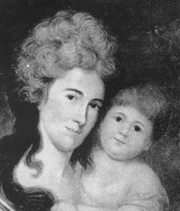
|
| Margaret Oswald Chew Howard |
When the decision was finally made to abandon Philadelphia, six of the British officers personally contributed twenty-five thousand dollars to throwing Philadelphia's most famous, most splendiferous party, called The Machianza. It went on for days, had real jousting matches between officers dressed like knights in armor, banquets and all that sort of thing. It was Andre's idea, and he was enthusiastically in charge. Surviving records of the event do not show that Peggy Shippen was present, but in view of what happened later, much of her correspondence has been destroyed. It's pretty hard to imagine she wasn't there.
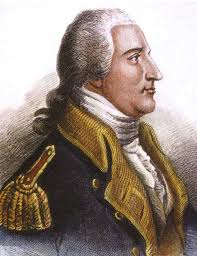
|
| Major General Benedict Arnold |
The British then marched away, and Washington's troops cautiously followed, assuming control of the city. Major General Benedict Arnold had been sent from Saratoga to Valley Forge to recover from his leg wound, and probably also to raise morale among the troops celebrating the now-famous hero. Washington more or less immediately decided to pursue the British across New Jersey, thus leading to the battle of Monmouth as the two armies raced for the Naval vessels in lower New York harbor. Since General Arnold had not fully recovered from his wounds, he was installed as the military governor of a somewhat bedraggled Philadelphia. Naturally, he was the center of the social scene, and soon was pursuing Peggy Shippen in every way he knew, which included some pretty gloppy letters in Romantic style. Peggy's father was uneasy about his intentions but was eventually mollified by Arnold's purchase of the house called Mount Pleasant, now a tourist attraction in Fairmount Park. With this evidence that his prospective son in law was at least likely to stay in Philadelphia, Edward Shippen finally repented of his opposition to the marriage of his daughter. But the new couple were soon off to West Point, where Arnold had kept up a persuasion campaign with George Washington, to get himself appointed the commandant of the main northern defense of the Hudson River. A point for Philadelphian tour guides to remember is that Peggy and Benedict never got a chance to live in Mount Pleasant.
Arnold originally lived in New Haven, Connecticut, where he had established quite a sea-faring reputation as a merchant, some would say privateer, others would say buccaneer. There is no doubt he was aggressive, and combative, and considered himself a little bit above the law. These qualities made him outstanding at Fort Ticonderoga and Saratoga, and are always more highly valued in young men in a war. Unfortunately, he made a bitter enemy of Joseph Read who was briefly his neighbor, and later was President of the Continental Congress. Read accused Arnold of smuggling and trading with the enemy, and was so determined about it that Arnold was scheduled for court-martial, but postponed. Arnold was loudly defensive about the whole matter, and public sympathy was on his side. In view of what soon happened, he might well have been cleared by the court, but likely there was some truth to the accusations. Using Peggy as a go-between, he entered into a correspondence with Andre (then the adjutant-general in New York) offering to deliver the surrender of West Point, three thousand prisoners, and possibly George Washington himself in return for what might today be half a million dollars. As a note of realism, he was willing to accept half that in the event of failure. The British were particularly anxious to acquire American prisoners to exchange for their own troops captured at Saratoga. Unless Arnold was a total sociopath, he must have thought he had quite a grievance.
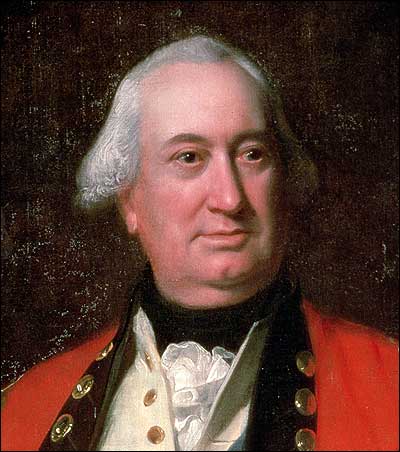
|
| Lord Cornwallis |
Things went along surprisingly well at first, with negotiations for price back and forth, plans for attacking West Point moving along with the Navy, and Andre disguising himself for a visit to Arnold in his house to the south of the Fort on West Point. Much of the success was due to the movie-star reputation of Benedict Arnold; few could imagine such a hero doing such an unheard-of thing. However, the plot was discovered while Washington was away visiting the Fort, and Arnold hastily abandoned his family and fled to a waiting British warship. Andre decided to make his way south to the ship through rebel territory, but local soldiers and farmers were much more suspicious than others had been, and after penetrating his disguise, found incriminating papers concealed in his boots. Since he was out of uniform behind enemy lines, Andre was by definition a spy, which required hanging. He made a plea to be shot like a gentleman, but Washington with tears allegedly in his eyes refused. With much bravado, Andre jumped atop his own casket and placed the noose around his own neck, a behavior much admired by his compatriots when they heard of it
Meanwhile, Peggy had put on a crazy-woman act which apparently convinced Washington to be lenient, and allow her to rejoin her husband. The couple stayed in New York for a few months, toying with commands of loyalist troops in the south, but eventually taking ship for England. Lord Cornwallis was on the same ship and they became pals as shipmates, pleasing Arnold quite a lot. Unfortunately, British society was only stiffly polite to them, and many did not trouble to conceal their disdain for traitors to any cause, and thus life in England was not smooth. By that time, it is possible that many had begun to suspect the whole idea of treason was Peggy's idea from the start, as is today the conventional view of it. As an American aristocrat, she was uncomfortable with the rebels in Philadelphia, and as the impetuous wife of an accused smuggler, it was difficult to fit in with either the Quakers or the merchants with loyalist leanings. No doubt she heard some catty whisperings among her friends and relatives about her other romantic associations. The British paid them their promised pensions, but a career in the British Army was out of the question for her husband. But the real shock would come, from discovering the British as a whole didn't much care for their behavior, either.
| Posted by: Warren Whiteside | Nov 28, 2011 8:06 PM |
25 Blogs
Background: Low-Hanging Fruit Starts Running Low
 Pennsylvania was settled relatively late; New England and Virginia were already starting to run out of virgin land. Therefore, Pennsylvania was less constrained by the 1758 Demarcation line.
Pennsylvania was settled relatively late; New England and Virginia were already starting to run out of virgin land. Therefore, Pennsylvania was less constrained by the 1758 Demarcation line.
Foreground: Parliament Irks the Colonial Merchants
 The Townshend Acts, upsetting trade and hated by Americans, bordered on economic warfare. The British tested tea, stamps and manufactures, but the most effective economic pressure points proved to be paper money and gunpowder. The Americans reacted to all this as second-class citizenship.
The Townshend Acts, upsetting trade and hated by Americans, bordered on economic warfare. The British tested tea, stamps and manufactures, but the most effective economic pressure points proved to be paper money and gunpowder. The Americans reacted to all this as second-class citizenship.
Pennsylvania: Browbeaten Into Joining a War
 America declared Independence on July 4, 1776, but England had decided a year earlier to suppress the rebellion by overwhelming force and announced it six months later. France was then smuggling in gunpowder and guns. But Pacifist Pennsylvania held out until there was a British naval attack in the Delaware River, in May 1776, and a huge army had arrived at New Brunswick in June. The British wanted to confront us with a choice of surrender or subjugation. We picked the third choice the British never considered, to resist until they treated us better.
America declared Independence on July 4, 1776, but England had decided a year earlier to suppress the rebellion by overwhelming force and announced it six months later. France was then smuggling in gunpowder and guns. But Pacifist Pennsylvania held out until there was a British naval attack in the Delaware River, in May 1776, and a huge army had arrived at New Brunswick in June. The British wanted to confront us with a choice of surrender or subjugation. We picked the third choice the British never considered, to resist until they treated us better.
Constitutional Liberty
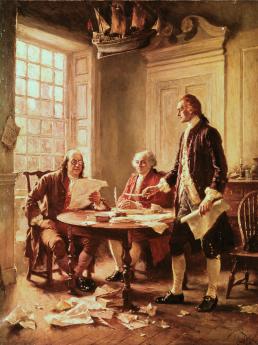 Robert Morris refused to sign the Declaration of Independence because what he really wanted was Constitutional Liberty. He didn't even mind being a British subject and didn't want a different King. What was this all about?
Robert Morris refused to sign the Declaration of Independence because what he really wanted was Constitutional Liberty. He didn't even mind being a British subject and didn't want a different King. What was this all about?
The Network
 By September 1776, the prodigiously energetic Robert Morris had set up an international network to evade the British blockades, arm the colonies, and encourage privateers to enrich themselves at British expense, if they could.
By September 1776, the prodigiously energetic Robert Morris had set up an international network to evade the British blockades, arm the colonies, and encourage privateers to enrich themselves at British expense, if they could.
Beaumarchais: A Playwright Brings France into the American Revolution
 Pierre-Augustin Beaumarchais, the author of the classic opera, The Barber of Seville was also a crucial financial and ideological supporter of the Revolutionary War.
Pierre-Augustin Beaumarchais, the author of the classic opera, The Barber of Seville was also a crucial financial and ideological supporter of the Revolutionary War.
Richard Henry Lee: A Pennsylvania Viewpoint
 Pennsylvania in 1776 was pacifist, prosperous, and slow to anger. Virginia was hot-headed and quick to anger. For some reason, Westmoreland County VA was the most extreme. Richard Henry Lee was their leader, and always the first to pound the table.
Pennsylvania in 1776 was pacifist, prosperous, and slow to anger. Virginia was hot-headed and quick to anger. For some reason, Westmoreland County VA was the most extreme. Richard Henry Lee was their leader, and always the first to pound the table.
Christmas, 1776, Behind the Scenes at Trenton
 Christmas may have been a good time to surprise the Hessians at Trenton. But it was also a week before many enlistments of Washington's Continental army expired. Now or never..
Christmas may have been a good time to surprise the Hessians at Trenton. But it was also a week before many enlistments of Washington's Continental army expired. Now or never..
Fort Wilson: Philadelphia 1779
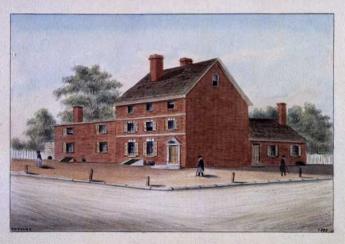 History was made at 3rd and Walnut, but so far, is unmarked.
History was made at 3rd and Walnut, but so far, is unmarked.
Robert Morris, In Charge By Popular Demand
 Franklin warned Morris: dictatorial powers in a crisis lead to a backlash, no matter how popular and necessary that arrangement may have first seemed.
Franklin warned Morris: dictatorial powers in a crisis lead to a backlash, no matter how popular and necessary that arrangement may have first seemed.
Private Sector Disciplines Congress
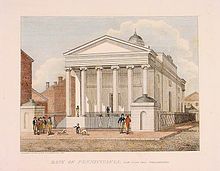 "The bond market won't let you" has disciplined American governments for two hundred years. Robert Morris invented the idea. The nation's first bank was really its first bond fund.
"The bond market won't let you" has disciplined American governments for two hundred years. Robert Morris invented the idea. The nation's first bank was really its first bond fund.
Robert Morris Invents American Banking
 It's now hard to imagine getting along without banks, but Robert Morris had to invent the idea in 1780. Many people were horrified.
It's now hard to imagine getting along without banks, but Robert Morris had to invent the idea in 1780. Many people were horrified.
Limits of Leverage
 The American Revolutionary War was supposed to lead to paradise, but nobody was very happy with the state of affairs it left behind.
The American Revolutionary War was supposed to lead to paradise, but nobody was very happy with the state of affairs it left behind.
Revolt of the Pennsylvania Line
After Yorktown, the American revolution seemed over, but peace negotiations dragged on, probably intentionally. The troops wanted to go home so badly they nearly lost the victory.
Robert Morris: Businessman Father of the Bureaucracy
 Only a few days after being appointed Financier, or acting President of the United States before the Constitution, Robert Morris swept away Congressional committees and replaced them with administrative employees.
Only a few days after being appointed Financier, or acting President of the United States before the Constitution, Robert Morris swept away Congressional committees and replaced them with administrative employees.
zzz Note: Robert Morris Think Big
.
Two Friends Create the Articles of Confederation
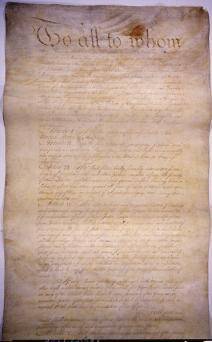 John Dickinson and Robert Morris were good friends who pushed the Articles of Confederation through to ratification. Both of them had been active critics of Great Britain's treatment of the colonies, but both hesitated to sign the Declaration, and both later relented and fought for Independence. Dickinson's final position is less clear, but it was Morris who first saw the weakness of the Articles, and pressed on for their replacement by the Constitution.
John Dickinson and Robert Morris were good friends who pushed the Articles of Confederation through to ratification. Both of them had been active critics of Great Britain's treatment of the colonies, but both hesitated to sign the Declaration, and both later relented and fought for Independence. Dickinson's final position is less clear, but it was Morris who first saw the weakness of the Articles, and pressed on for their replacement by the Constitution.
Those Troublesome Lees of Virginia
It's difficult for Pennsylvanians to understand why the Lee family of Virginia made so much trouble for our heroes, Robert Morris, Benjamin Franklin, Gouverneur Morris in particular. Perhaps it was a cultural clash.
Why Jefferson Hated Banks and Hamilton Loved Them

Bretton Woods
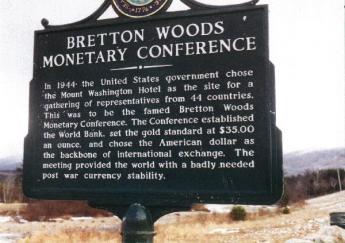 The Bretton Woods conference in 1944 was very simple. The U.S. dollar alone was convertible into gold, but all other currencies were convertible into U.S. dollars. To prevent Fort Knox from being completely depleted of gold, the convertibility of dollars into gold was also soon discontinued. Effectively, all money everywhere was thus just a computer notation, controlled by the U.S.government. Temporarily, the dollar became a reserve currency, supplementing gold. Effectively, we were testing whether we needed a metallic standard at all.
The Bretton Woods conference in 1944 was very simple. The U.S. dollar alone was convertible into gold, but all other currencies were convertible into U.S. dollars. To prevent Fort Knox from being completely depleted of gold, the convertibility of dollars into gold was also soon discontinued. Effectively, all money everywhere was thus just a computer notation, controlled by the U.S.government. Temporarily, the dollar became a reserve currency, supplementing gold. Effectively, we were testing whether we needed a metallic standard at all.
Cyprus Tests the Limits of Paper Money

Gold Standard Substitutes
 The monetary crisis which continues since 2007 keeps financiers searching for a better monetary system.
The monetary crisis which continues since 2007 keeps financiers searching for a better monetary system.
Robert Morris, Financial Virtuoso
Robert Morris had two episodes of being in charge of the American government, one before and the other after, the class warfare at Fort Wilson. In both cases, he displayed a virtuoso ability to innovate in a novel emergency.
Penman of the Constitution
 The courts have spent a fair amount of time arguing about the meaning of phrases, words and even punctuation in the Constitution. That's what constitutional lawyers think they are paid to do. It seems possible the document survived for centuries, only because its final wording was left to a lawyer who took words seriously, using as few as possible.
The courts have spent a fair amount of time arguing about the meaning of phrases, words and even punctuation in the Constitution. That's what constitutional lawyers think they are paid to do. It seems possible the document survived for centuries, only because its final wording was left to a lawyer who took words seriously, using as few as possible.
Peggy Shippen and Benedict Arnold: Fallen Idols
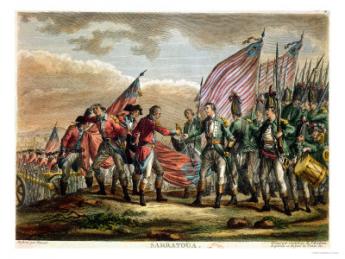 The hero of the Battle of Saratoga married the Queen of Philadelphia society, but then betrayed the country.
The hero of the Battle of Saratoga married the Queen of Philadelphia society, but then betrayed the country.